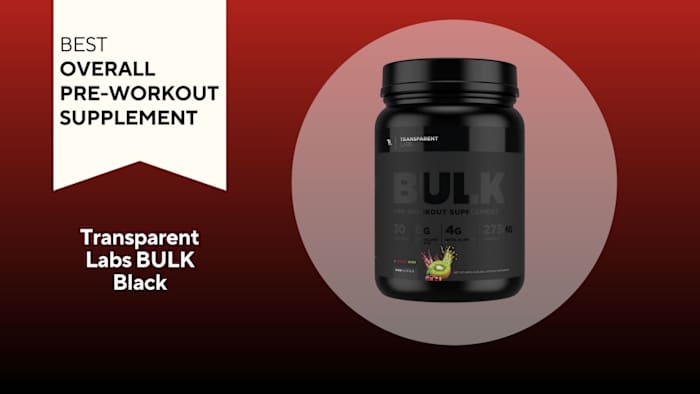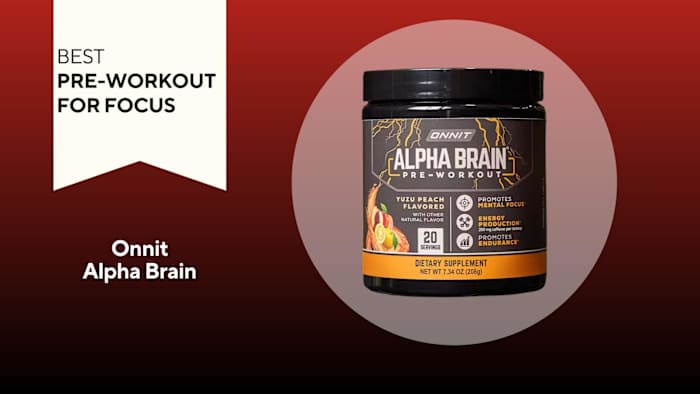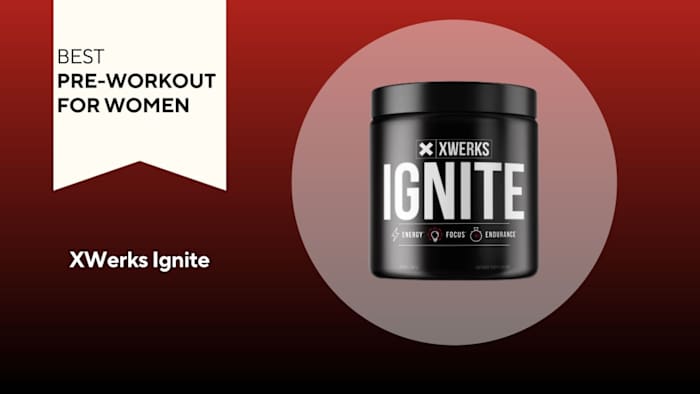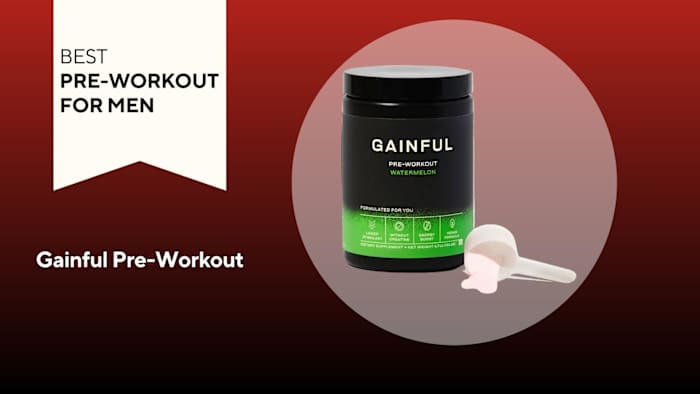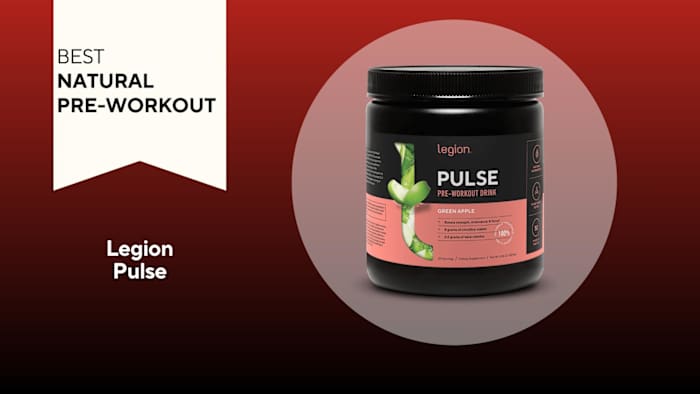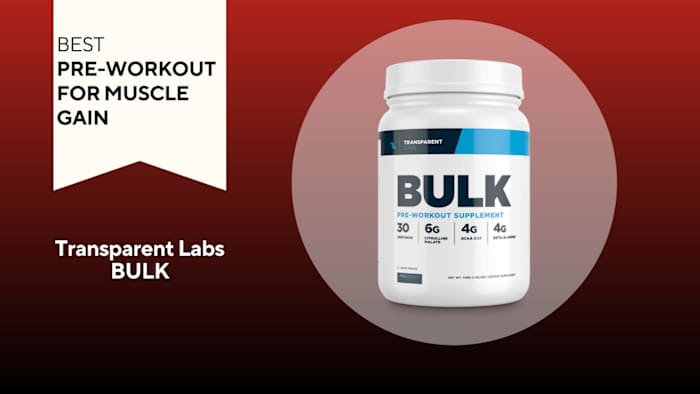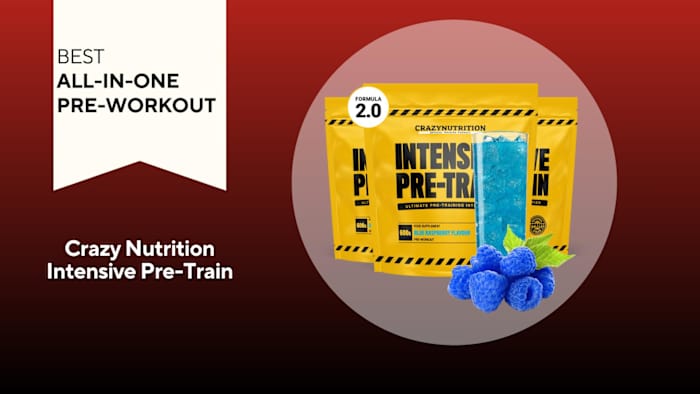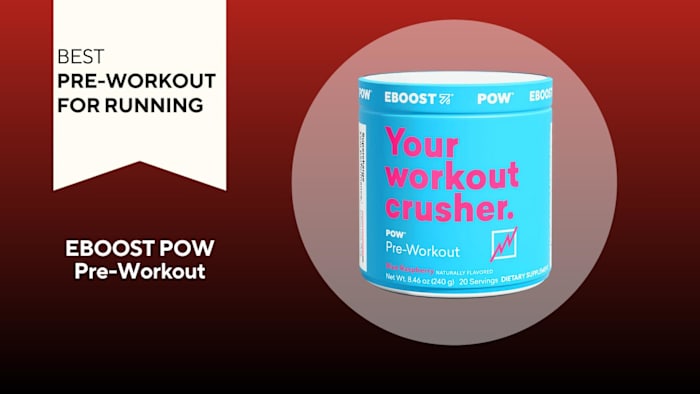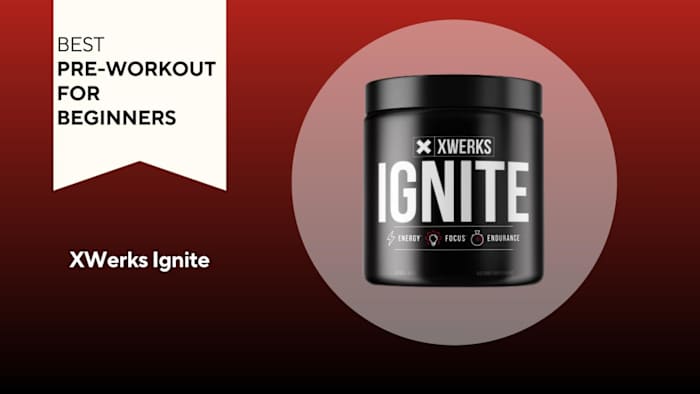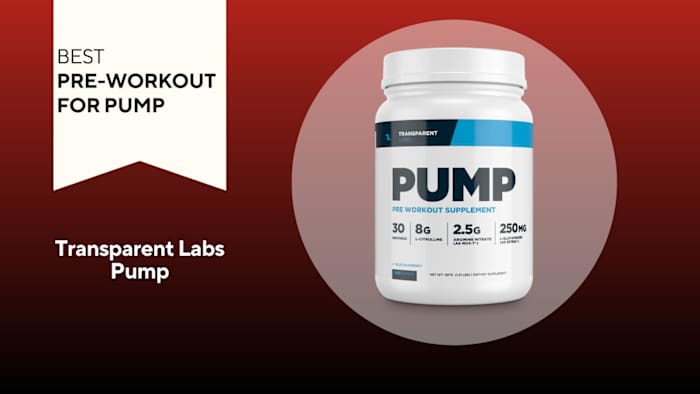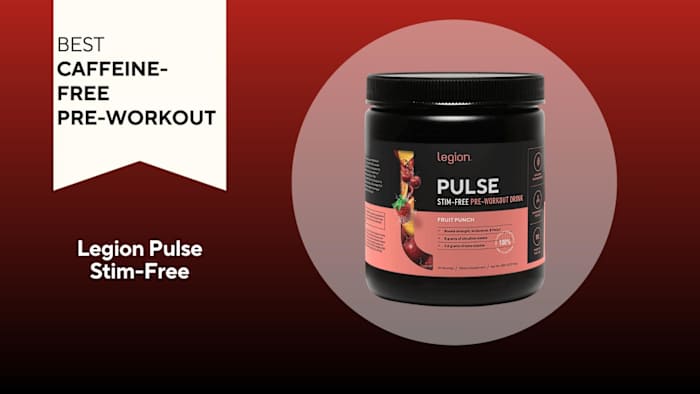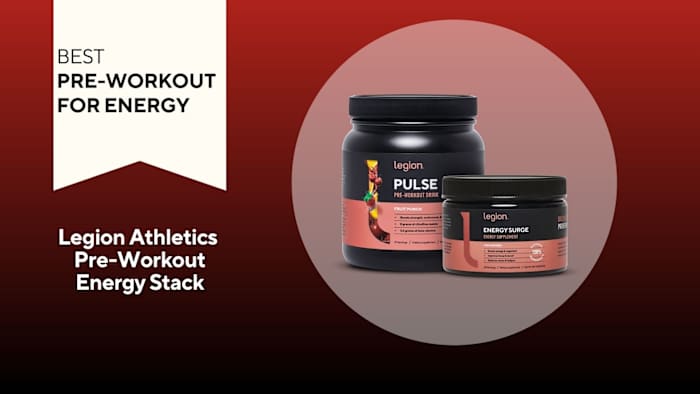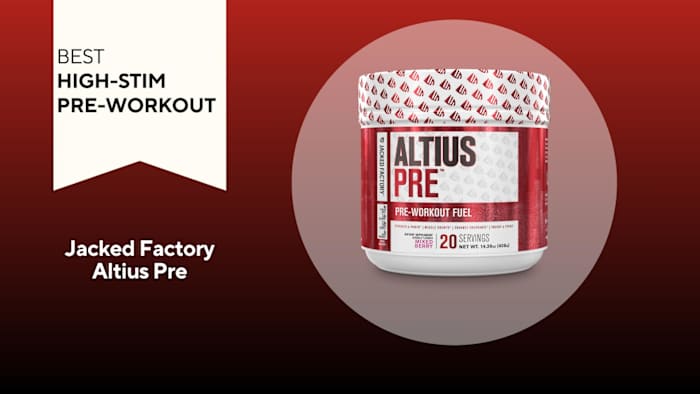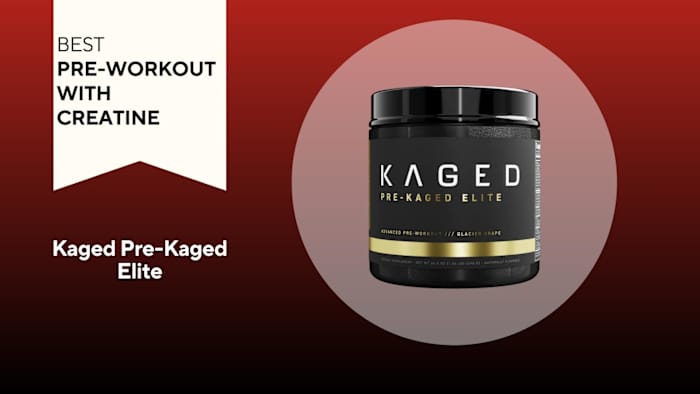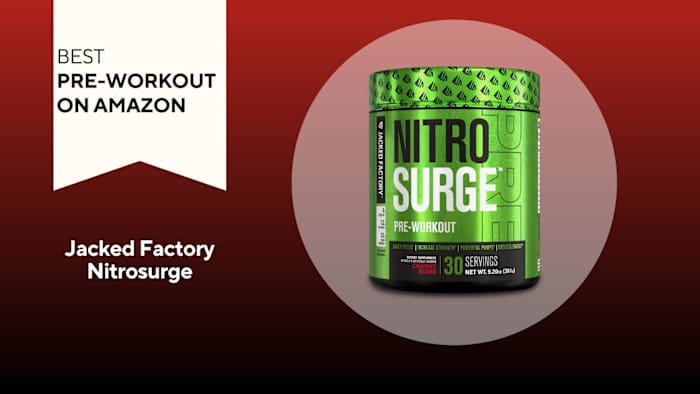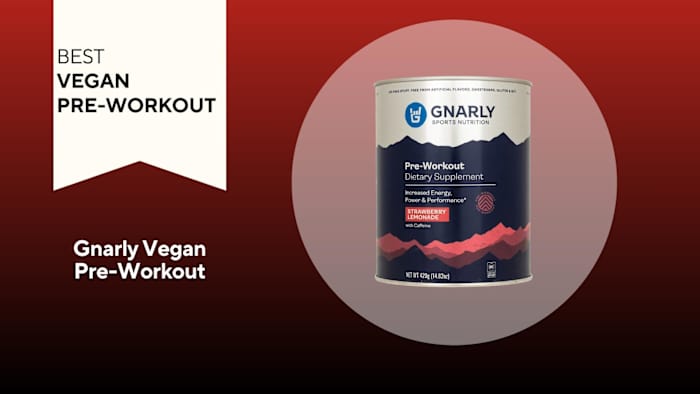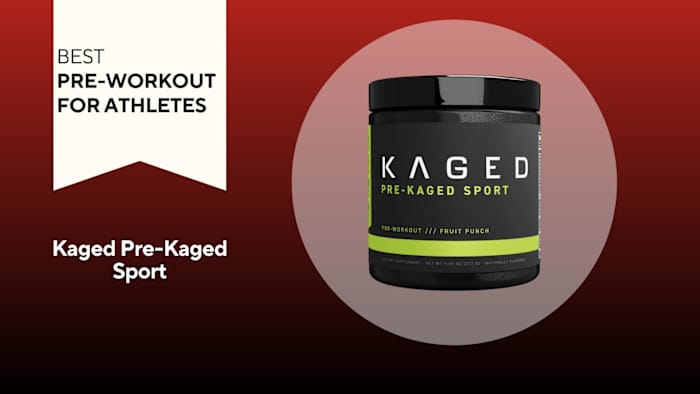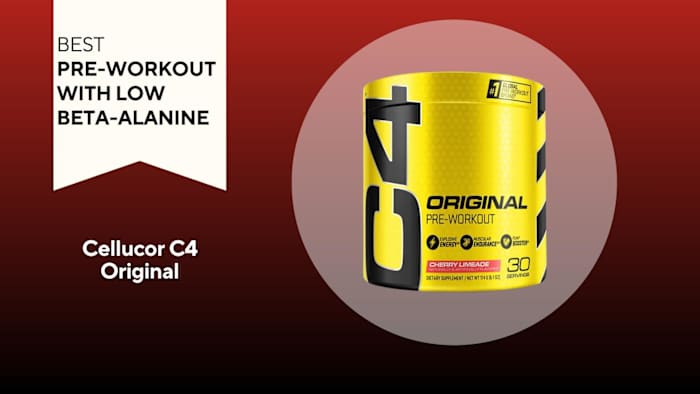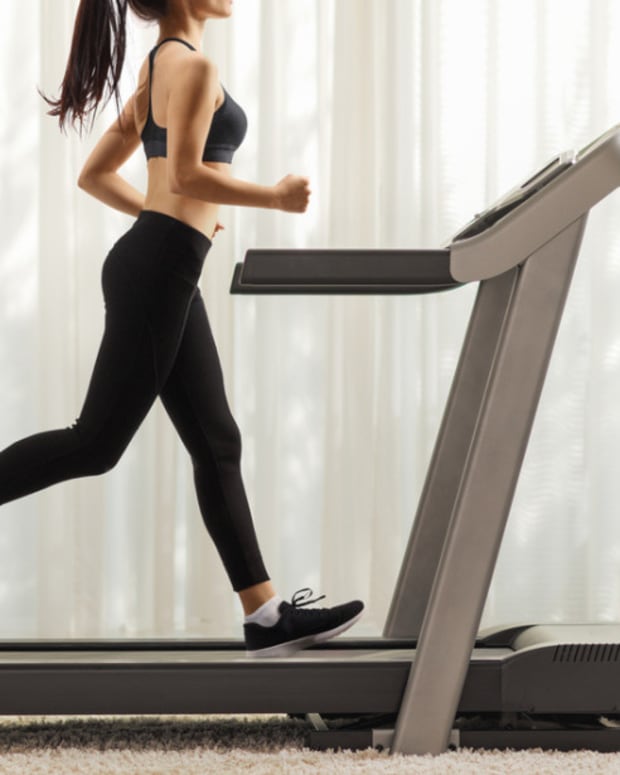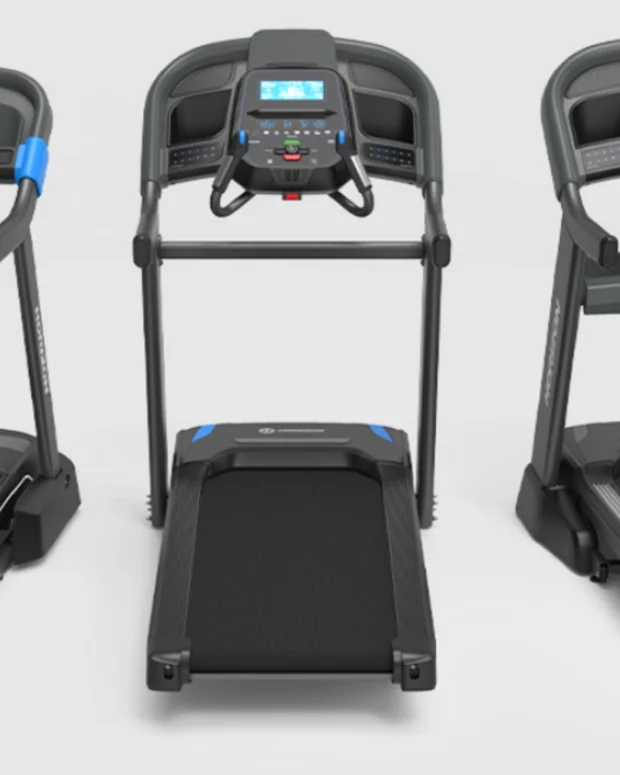The products featured in this article have been independently reviewed. When you buy something through the retail links on this page, we may earn commission at no cost to you, the reader. Sports Illustrated editorial staff are not involved in the creation of this content. Learn more here.
I vividly remember my first time using a pre-workout supplement before hitting the gym. I was 10 minutes from the gym and blasting my usual pump-up music in my car after work, and suddenly it hit me: this tingling sensation engulfed me, and then I felt a surge of energy course through my body. I pulled up to the gym and entered through the doors like I was a superhero, and despite being a scrawny 18-year-old, I remember crushing that workout. My body felt stronger, my muscles looked bigger and the weights felt lighter.
At that point in time, I had no idea what to look for in a pre-workout supplement, but I've since tested shelves-worth of pre-workout formulas. This list of the best pre-workout supplements is the culmination of the SI product testing team's top picks and my experiences using these products as a certified sports nutrition coach and personal trainer. I've also leaned on the expertise of ISSA certified personal trainer and USAW L2 competitor Gary Gall.
This list can help you find the best pre-workout for your goals and routine—without as much trial and error, which can be expensive. I've also included a guide to common pre-workout ingredients and how to effectively use pre-workouts, and answered the top pre-workout supplement questions of 2024.
This content is meant to be informative, but should not be taken as medical advice. It is not intended for use as diagnosis, prevention or treatment of health problems. Always speak with your doctor before starting any new supplement or exercise regimen.
Our Picks for the Best Pre-Workouts of 2024:
- Best Overall Pre-Workout: Transparent Labs BULK Black
- Best Pre-Workout for Focus: Onnit Alpha Brain
- Best Pre-Workout for Women: XWerks Ignite
- Best Pre-Workout for Men: Gainful Pre-Workout
- Best Natural Pre-Workout: Legion Pulse
- Best Pre-Workout for Muscle Gain: Transparent Labs BULK
- Best All-in-One Pre-Workout: Crazy Nutrition Intensive Pre-Train
- Best Pre-Workout for Running: EBOOST POW Pre-Workout
- Best Pre-Workout for Beginners: XWerks Ignite
- Best Pre-Workout for Pump: Transparent Labs Pump
- Best Caffeine-Free Pre-Workout: Legion Pulse Stim-Free
- Best Pre-Workout for Energy: Legion Athletics Pre-Workout Energy Stack
- Best High-Stim Pre-Workout: Jacked Factory Altius Pre
- Best Pre-Workout with Creatine: Kaged Pre-Kaged Elite
- Best Pre-Workout on Amazon: Jacked Factory Nitrosurge
- Best Vegan Pre-Workout: Gnarly Vegan Pre-Workout
- Best Pre-Workout for Athletes: Kaged Pre-Kaged Sport
- Best Pre-Workout with Low Beta-Alanine: Cellucor C4 Original
How We Chose The Best Pre-Workouts in 2024
For this guide, we compiled the top pre-workout supplements on the market based on our pre-workout testing methodology and stim-free pre-workout testing methodology. We aim to include products that incorporate a wide variety of benefits and that fit many different lifestyles, dietary preferences and budgets. These pre-workouts were chosen by a certified sports nutrition coach with input from our panel nutrition experts. Learn more about how we chose the best pre-workout supplements in the methodology section below.
Best Overall Pre-Workout: Transparent Labs BULK Black
Key features and specs:
- Servings per container: 30
- Cost: $59.99 ($2.00 per serving)
- Active ingredients: Citrulline Malate (8,000 milligrams), Astragin (50 milligrams), Beta-Alanine (4,000 milligrams), Betaine Anhydrous (2,500 milligrams), Taurine (1,300 milligrams), L-Tyrosine (1,000 milligrams), Alpha-GPC (300 milligrams), Caffeine Anhydrous (275 milligrams), L-Theanine (200 milligrams), DiCaffeine Malate (30 milligrams), Theobromine (50 milligrams)
- Caffeine: 275 milligrams
- Flavors: Cherry Kiwi, Blue Raspberry, Peach Mango, Sour Gummy, Black Cherry
- Best for: Those who need a significant caffeine boost ahead of exercising; those preparing for a strength training workout
Why I picked it:
There’s normal pre-workout, and then there’s THE best pre-workout powder, and Transparent Labs PreSeries BULK Black is the best of the best. This formula packs in 17 active ingredients in clinically effective doses, including 275 milligrams of caffeine, which should give even those with a high caffeine tolerance a significant boost during strength training. It also contains nootropics to help you focus, plus citrulline malate (11), betaine anhydrous (45) and taurine (56) for improved blood flow, muscle growth and reduced muscle fatigue.
While this formula is made to help you push through your rep or weight goals, it’s also designed to keep you from crash-landing. The formula includes ingredients like l-theanine (66), dicaffeine malate (Infinergy) and theobromine (67) that may work synergistically with caffeine to provide steady energy with less of the side effects associated with stimulants (though more research is needed).
Our team really enjoyed the Blue Raspberry flavor, and likened it to candy without the chemical taste of artificial sweeteners (it's sweetened with stevia extract). The powder mixed really easily in water, and everyone quickly felt an energy boost. The energy lasted for the duration of the workout, and the team didn't experience a major caffeine crash. The beta alanine tingles were minor, but noticeable.
While I don't consider the BULK Black pre-workout formula to be budget friendly ($2.00/serving), it is undoubtedly worth the expense for those who want a well-dosed, tasty, premiere pre-workout supplement.
What we love:
- Packed with clinically effective doses of active ingredients
- Relies on scientific studies for ingredient selection
- Third-party tested by Informed Choice for quality, safety and purity
- Free from artificial coloring, sweeteners and preservatives
- Gluten-free and non-GMO
What to consider:
- High dose of caffeine isn't a good fit for those with stimulant sensitivities
- Some ingredients need more research to determine effectiveness
- Expensive
Best Pre-Workout for Focus: Onnit Alpha-Brain Pre-Workout
Key features and specs:
- Servings per container: 20
- Cost: $59.99 ($2.99 per serving)
- Active ingredients: Noogandha (trademarked form of ashwagandha extract), L-citrulline, AlphaSize (trademarked form of alpha-GPC), beta-alanine, caffeine anhydrous, Dynamine (a trademarked form of methylliberine)
- Caffeine: 200 milligrams
- Flavors: Yuzu Peach, Tiger's Blood
- Best for: Those who want extra energy and focus before a strength training workout
Why I picked it:
It’s common for athletes and fitness enthusiasts to use pre-workout powders that focus solely on improving physical performance. However, some pre-workout supplements, such as Onnit Alpha-Brain Pre-Workout, are also designed to increase mental alertness, improve memory and enhance focus. According to Onnit, this supplement can help you achieve a state of flow or being “in the zone.” These potential benefits are due to the product's ingredient list, which includes NooGandha, AlphaSize and Dynamine.
NooGandha is a trademarked ashwagandha extract, and similar to ashwagandha supplements, it’s used to reduce stress and enhance wellbeing by reducing cortisol levels in the body (1)(3). One study found that 225 milligrams per day (6)(88), which is the amount found in Onnit Alpha-Brain Pre-Workout, was sufficient to induce these physiological benefits.
The next ingredient, AlphaSize, is a trademarked version of alpha-GPC which is designed to promote the production of acetylcholine (7), a powerful neurotransmitter that has been shown to increase motivation (8). The only issue is that the majority of scientific testing demonstrating the effectiveness of alpha-GPC on cognitive performance was done using 200 to 400 milligrams per day, and Onnit Alpha-Brain Pre-Workout only has 125 milligrams, so the positive effects may be limited.
The final unique ingredient is Dynamine, which works in a similar manner to caffeine by blocking the body’s adenosine receptors that make you feel tired (24). Also, Dynamine hasn’t been shown to cause the same anxiety or jitters as caffeine (25).
It’s important to note that, while some of these ingredients may be slightly underdosed, that doesn't mean the product won’t work for you. It’s likely that the combination of these ingredients will provide cognitive benefits, truly making this one of the best focus pre-workout supplements available. Onnit also offers a risk-free money-back guarantee. If you’ve tried the supplement for at least two weeks and still don’t feel the effects, you can return it for your money back.
Related Post: The Best Vitamins for Brain Fog, Ranked by Our Experts
What we love:
- Formulated with evidence-backed ingredients for mental focus
- Contains 200 milligrams of caffeine per serving, which is helpful for early morning workouts
- Subscriber save 15%
What to consider:
- Expensive ($3.00 per serving, and)
- Each container has only 20 servings, meaning you’ll need to reorder more often
Best Pre-Workout for Women: XWerks Ignite
Key features and specs:
- Servings per container: 30
- Cost: $49.99 ($1.66 per serving)
- Active ingredients: Vitamins B6 & B12, L-Citrulline Malate, Calcium, Magnesium Lactate, CarnoSyn Beta-Alanine, L-Tyrosine, DMAE, Rhodiola Rosea, Caffeine
- Caffeine: 150 milligrams
- Flavors: Green Apple, Orange, Blue Raspberry, Watermelon
- Best for: Women who want a pre-workout that boosts energy and focus without overloading on stimulants
Why I picked it:
XWerks Ignite is a good alternative to the common pre-workout formulas that are stimulant-heavy. Ignite does have 150 milligrams of caffeine, but that’s less than the amount of caffeine in two cups of coffee (27). Instead, Ignite focuses on Rhodiola rosea, which is a nootropic that may help reduce your muscle recovery time and improve your explosive output (26).
According to that same study, best results were seen when 500 milligrams of Rhodiola were given about a half hour before a workout, which is exactly the dose included in the Ignite formula.
Another key ingredient in this formula is DMAE (or Deanol), which XWerks claims can help improve cognitive function, though there are limited studies to support this. Other important ingredients include vitamins B6 and B12, which help make energy production efficient (28) and L-tyrosine, which is an amino acid that may boost cognitive function (29). Ignite contains 2 grams of L-tyrosine, which is only 33 percent of the most effective dose (6 grams), but it’s still within the effective range.
Related Post: The Best Pre-Workout Supplements for Women
What we love:
- The formula includes Rhodiola rosea, which can improve explosive power and muscle recovery during exercise (26)
- Includes a small dose of L-Tyrosine which could boost your muscle’s power output
- Costs around $0.30 less per serving than the other pre-workout supplements on our list
What to consider:
- Offers a caffeine boost, but less caffeine than other common pre-workout brands
Best Pre-Workout for Men: Gainful Pre-Workout
Key features and specs:
- Servings per container: 14
- Cost: $26 ($1.86 per serving)
- Active ingredients: (Based on tester’s personalized formula) L-Citrulline DL-Malate 2:1 (4,000 milligrams), creatine monohydrate (3,000 milligrams), beta alanine (1,500 milligrams), leucine (1,000 milligrams), isoleucine (500 milligrams), valine (500 milligrams)
- Caffeine: Optional
- Flavors: Watermelon, Strawberry Lemonade
- Best for: Those looking for a more personalized pre-workout supplement
Why I picked it:
Gainful stands out as a pre-workout supplement for men because of the consumer’s ability to customize their order. Far from being a silly gimmick, having a more tailored approach to your health is an excellent approach, akin to having a personal dietician. In fact, when you have a subscription to Gainful, you also get access to chat with a dietician.
But back to the pre-workout: Technically, this will be a choose-your-own-adventure. You can go for a stim or non-stim based, creatine or no creatine—the choice is yours. In our tester’s formulation of Gainful, one scoop boasted 4,000 milligrams of citrulline malate. A study of gym-goers in Spain who took 8,000 milligrams of citrulline malate one hour before resistance training found they had less muscle soreness 24 and 48 hours later when compared to the control group (15).
Our tester loved the watermelon flavor, and the other option, strawberry lemonade, got rave reviews as well. And all in all, reviews of Gainful averaged a 4.6 out of 5 on its website from more than 1,173 reviews at publishing time. One user wrote “Always a great boost to my workouts and a solid product to have in rotation!”
Related Post: Gainful Protein Powder Review
What we love:
- An effective option for those with caffeine sensitivities or who want a non-stim pre-workout supplement
- Made without gluten, soy and dairy components
- Ingredients are backed by research and clinical studies
- Tailored to align with your individual health and fitness objectives
What to consider:
- A pricier, subscription-only pre-workout
Best Natural Pre-Workout: Legion Pulse
Key features and specs:
- Servings per container: 20
- Cost: $44.99 ($2.25)
- Active ingredients: Caffeine anhydrous, L-theanine, citrulline malate, beta-alanine, alpha-GPC 50%, betaine anhydrous
- Caffeine: 350 milligrams
- Flavors: Apple Cider, Arctic Blast, Blood Orange, Blueberry Lemonade, Cherry Limeade, Fruit Punch, Green Apple, Grape, Mojito, Peach Ring, Piña Colada, Pink Lemonade, Rainbow Sherbert, Sour Candy, Strawberry Kiwi, Strawberry Margarita, Blue Raspberry, Watermelon, Tropical Punch, Frosted Cranberry
- Best for: Those who want a well-dosed pre-workout supplement with no artificial ingredients and those who want a big caffeine boost before a workout
Why I picked it:
Many popular pre-workout supplements contain artificial ingredients sweeteners, flavors or colors. Legion Athletics stands apart with its commitment to providing customers with sports supplements free of artificial ingredients and rigorously tested by third parties.
Legion Pulse is an all-natural pre-workout formula that contains six active ingredients and a handful of mineral electrolytes to promote healthy hydration (69). In addition, Legion Pulse’s list of ingredients rivals that of some of the largest supplement companies in the space, containing 8,000 milligrams of L-citrulline malate, 3,600 milligrams of beta-alanine, 2,500 milligrams of betaine anhydrous and 350 milligrams of caffeine anhydrous per serving. One study in the Journal of the International Society of Sports Nutrition found that Legion Pulse increased perceived ratings of energy and showed improved force when performing exercises like the squat (74). (Note that the study was supported by a research grant from Legion Athletics, Inc.)
Pulse also comes in 18 flavors that are naturally sweetened with stevia, erythritol and monk fruit extract. My personal favorites are Strawberry Kiwi, Cherry Limeade and Pink Lemonade, but many consumer reviews from the Legion website claim the Peach Ring flavor is the way to go.
What we love:
- Formula is effectively dosed with evidence-backed ingredients
- Lots of candy and beverage-inspired flavors to choose from
- Also available in a caffeine-free version
What to consider:
- 350 milligrams of caffeine is close to the recommended 400-milligram upper limit and may be too much for those sensitive to caffeine
- Each container has only 20 servings, meaning you’ll need to reorder more often
Best Pre-Workout for Muscle Gain: Transparent Labs Bulk
Key features and specs:
- Servings per container: 30
- Cost: $49.99 ($1.67 per serving)
- Active ingredients: Citrulline malate, beta-alanine, betaine anhydrous as BetaPure, taurine, L-tyrosine, AlphaSize 50% alpha-GPC, PurCaf organic caffeine from green coffee bean, L-theanine, theobromine, Senactiv, BioPerine
- Caffeine: 200 milligrams
- Flavors: Strawberry Lemonade, Strawberry Kiwi, Piña Colada, Blue Raspberry, Black Cherry, Peach Mango, Tropical Punch, Sour Grape, Watermelon, Watermelon Peach, Cherry Splash, Orange
- Best for: Those in a cutting phase who want to maintain lean muscle; anyone looking for a well-dosed pre-workout with moderate caffeine content
Why I picked it:
Transparent Labs Bulk is a powerhouse pre-workout supplement designed to support lean muscle gain. While pre-workout powders don’t contain protein, they are a fantastic product to ensure you’re stimulating new muscle growth by training at your full potential (75). What makes this product so unique is that it contains a staggering 17-ingredient formulation created to enhance strength, improve stamina and increase both energy and focus during training.
Some of the notable ingredients include citrulline malate (8,000 milligrams), beta-alanine (4,000 milligrams), betaine anhydrous (2,500 milligrams), taurine (1,300 milligrams) and caffeine (200 milligrams), all of which are included at clinically effective dosage levels. This is important because, while many pre-workout powders contain a number of the same ingredients, they are often underdosed and therefore ineffective. For example, a study in the Journal of Strength and Conditioning Research found that an eight-gram dose of citrulline malate (which is found in Transparent Labs Bulk) was necessary to increase muscular endurance and strength performance (76). As with all of the ingredients in the formulation, anything less may not allow you to see the same strength and muscle building effects.
Additionally, products from Transparent Labs are third-party tested for purity, certified banned substance free by Informed Choice and never contain proprietary blends or artificial ingredients.
What we love:
- Formula packed with evidence-backed ingredients
- Moderate amount of caffeine, which keeps this product beginner-friendly
- No artificial flavors, colors or sweeteners
- 12 flavors to choose from that many reviewers say aren’t too sweet
What to consider:
- Not ideal for those who exercise after work because of caffeine content
Best All-in-One Pre-Workout: Crazy Nutrition Intensive Pre-Train
Key features and specs:
- Servings per container: 30 or 20 for Green Apple flavor
- Cost: $64.99 or $59.99 for Green Apple flavor ($2.17 or $2.99 for Green Apple flavor)
- Active ingredients: Citrulline malate, beta-alanine, taurine, ashwagandha, caffeine (no caffeine in Green Apple flavor)
- Caffeine: 200 milligrams or none for Green Apple flavor
- Flavors: Green Apple, Fruit Punch, Blue Raspberry
- Best for: Those who want a single, moderately dosed supplement for improved athletic performance, focus, energy and hydration
Why I picked it:
Intensive Pre-Train from Crazy Nutrition is an all-in-one pre-workout powder that contains 13 key ingredients and 10 vitamins and minerals. This supplement was developed to improve your energy, focus, drive, endurance and strength. The ingredients list and dosage levels make it an effective supplement for a wide range of different fitness enthusiasts, ranging from bodybuilders to CrossFitters to endurance athletes. The reason for this is a bit counterintuitive: While all of the ingredients are included in clinically effective dosages, they are on the low-end of the range, which in this case is actually a benefit not a downside. Why? The formula is accessible for beginners, regular gym-goers and athletes alike.
Intensive Pre-Train contains common pre-workout ingredients like citrulline malate, beta-alanine, betaine anhydrous, taurine and caffeine. In addition, it also contains a range of lesser known components like glycerol monostearate, glucuronolactone, L-phenylalanine and two trademarked ingredients, KSM-66 and En-Xtra.
Glycerol monostearate is known for its ability to increase the total volume of water in the body. This property has been shown to enhance both anaerobic and aerobic performance by increasing hydration, delaying fatigue and improving the body’s thermoregulation (77). It’s important to note that, while glycerol was previously a banned substance for its ability to hyper-hydrate the body, it was removed from the World Anti-Doping Agency’s (WADA) prohibited list in 2018.
The next ingredient, glucuronolactone, is one that needs further testing, however, some studies claim that this natural compound has been shown to increase endurance capacity, improve focus and concentration and reduce subjective feelings of fatigue (78). That being said, this ingredient is often studied as part of a multi-ingredient pre-workout or energy drink, and it's difficult to say whether these benefits are from glucuronolactone alone.
The next ingredient is L-phenylalanine, which is an amino acid that may help stimulate whole body fat oxidation and ultimately help with weight loss (79). The final two ingredients are KSM-66, which is a combination of ashwagandha and withania somnifera, and En-Extra, also known as alpinia galanga. In a double-blind, randomized placebo-controlled clinical trial, KSM-66 was found to reduce stress, improve sleep quality, enhance memory and cognition and increase strength, endurance and immune function (80). En-Extra has been shown to improve mental alertness, as well as impede the typical caffeine crash associated with pre-workout supplements. This particular effect is noted by many consumer reviews on the Crazy Nutrition website, with one user writing, “I love Crazy Nutrition’s Pre-Train because it gives me quick energy that’s smooth and focused. No jitters and no nasty taste.”
What we love:
- Formulated for focus and energy without caffeine jitters
- Moderate (but effective) dosing is good for both beginners and experienced gym-goers
- Available in caffeinated and caffeine-free versions
- Subscribers save 30%
What to consider:
- Expensive without subscription ($2.17 per serving vs $1.52 per serving with subscription)
- Only two caffeinated flavors and one non-stim flavor
Best Pre-Workout for Running: EBOOST POW Pre-Workout
Key features and specs:
- Servings per container: 20 serving tub, or box of 15 packets
- Cost: Tub is $32.99 ($1.64 per serving), box is $29.99 ($1.99 per serving) but EBOOST offers a subscribe and save option for 20% off
- Active ingredients: Sodium, potassium, CarnoSyn® beta-alanine, N-Acetyl-L-tyrosine, organic beet root powder, calcium fructoborate, L-theanine, caffeine, Dimethylaminoethanol, Hydroxytryptophan
- Caffeine: 175 milligrams
- Flavors: Blue Raspberry, Tropical Punch, Berry Melon Fizz
- Best for: People who want a relatively light dose of caffeine in their pre-workout; cardio workouts like running, swimming, cycling and dance
Why I picked it:
While most pre-workout supplements are formulated for those days when you’re lifting heavy weights, there are some products on the market that are designed to push you through a long and demanding run or cardio session. With endurance in mind, we chose EBOOST POW as the best pre-workout for running.
The POW formula has a combination of beetroot juice powder and natural caffeine. Research has shown that beetroot acts in a similar manner to L-citrulline, enhancing performance for some aerobic exercises by improving oxygen delivery in the body and delaying the onset of fatigue (73). POW also contains a modest dose of caffeine (175 milligrams) which should provide focus and performance benefits without the negative side effects (30). Since higher doses of caffeine can increase heart rate, endurance athletes like runners and swimmers attempt to keep their heart rate as low as possible during long-distance races. Multiple reviewers on the EBOOST website agree that POW did not leave them with the dreaded crash or shaky feeling that pre-workouts with a higher caffeine content can. In fact, one user on the EBOOST website writes, “Gives you a burst of energy without the jitters or sugary feeling in your mouth. Best pre-workout I’ve used to date.”
Each serving of POW also contains 1,600 milligrams of beta-alanine. A common ingredient in pre-workout, beta-alanine may be able to reduce muscle fatigue and improve exercise performance if taken consistently for at least two weeks (51). Five-time CrossFit games champion Mat Fraser credits beta-alanine in particular for a lot of his cardio success, claiming this supplement gave him a “third-lung.” Studies have shown a correlation between beta-alanine supplementation and a boost in athletic endurance for up to 25 minutes (51); however, more research is needed to learn the amino acid’s benefits beyond that time frame.
What we love:
- Formulated specifically for distance runners and cardio workouts
- Modest dose of caffeine for boost in energy and focus with a lower chance of elevated heart rate or post-caffeine “crash”
- Offered in a bulk container or single serving packets for easy packing
What to consider:
- 175 milligrams of caffeine may be too much caffeine for some runners
- Each serving has 2 grams of added organic cane sugar
- Beta-alanine may cause paresthesia—a harmless, temporary tingling sensation in the skin
Best Pre-Workout for Beginners: XWerks Ignite
Key features and specs:
- Servings per container: 30
- Cost: $49.99 ($1.66 per serving)
- Active ingredients: Vitamins B6 & B12, L-Citrulline Malate, Calcium, Magnesium Lactate, CarnoSyn Beta-Alanine, L-Tyrosine, DMAE, Rhodiola Rosea, Caffeine
- Caffeine: 150 milligrams
- Flavors: Green Apple, Orange, Blue Raspberry, Watermelon
- Best for: Those new to pre-workout and those looking to avoid the jitters sometimes associated with highly caffeinated pre-workout supplements
Why I picked it:
XWerks Ignite is a moderately dosed pre-workout supplement that’s more geared toward beginners than advanced athletes and bodybuilders. Ignite contains all of the major active ingredients you'd expect in a pre-workout supplement, but the dosage levels are around half of what you find in the top-tier pre-workout powders on the market. While this may seem like a downside, this supplement is a great option for users who are new to pre-workout supplements, or those who are sensitive to caffeine. This supplement also works as a great transition product for beginners who may have started their fitness journey using non-stim pre-workouts, but are ready to dip their toes into the world of more powerful caffeinated products.
Ignite features a combination of vitamins, minerals and a range of active ingredients, such as L-citrulline malate (3,000 milligrams), L-tyrosine (2,000 milligrams), CarnoSyn beta-alanine (1,500 milligrams) and caffeine anhydrous (150 milligrams). Ignite also features two less common ingredients—Rhodiola (500 milligrams) and DMAE bitartrate (200 milligrams)—which are steadily rising in popularity as more scientific evidence is coming out regarding their effects on sports performance.
A recent 2022 study reviewing 10 papers on Rhodiola rosea found that the majority of studies reported that supplementation has a positive effect on sports performance. Some of the key findings include a reduction in pain and muscle damage after exercise, enhanced antioxidant capacity and improved power output (27). Similar findings are true for DMAE bitartrate, a choline precursor that enhances acetylcholine production in the brain. This relates to overall sports performance because acetylcholine is the primary neurotransmitter involved in learning and memory (87). This supplementation has translated into improvements in alertness, attention, overall mood and even sleep quality (87). That being said, the evidence suggests the daily dosage should be between 500 and 2,000 milligrams per day, so Ignite does fall short here (87).
If you’re interested in trying Ignite out for yourself, then you can feel confident knowing products from XWerks are well-known for their great taste. Our team has personally tried a few of the flavors, including Watermelon and Orange, and although pretty sweet (sweetened with sucralose), they were fairly true to flavor.
What we love:
- Moderately dosed formula is geared towards beginners
- Relatively low caffeine content, which is ideal for those transitioning from a non-stim to caffeinated pre-workout
- Positive notes from our testers, including good energy and focus
What to consider:
- Contains artificial flavoring
- Sweetened with the artificial sweetener sucralose
Best Pre-Workout for Pump: Transparent Labs Pump
Key features and specs:
- Servings per container: 30
- Cost: $49.99 ($1.66 per serving)
- Active ingredients: L-citrulline, arginine nitrate (as NO3-T), betaine anhydrous (as BetaPure), L-tyrosine, L-glutathione (as Setria), Astragin
- Caffeine: None
- Flavors: Blue Raspberry, Strawberry Lemonade
- Best for: Those looking to build muscle and increase weight during strength training; those who want a non-stim pre-workout supplement
Why I picked it:
Transparent Labs Pump is a stim-free pre-workout that contains ingredients like L-citrulline (8,000 milligrams), arginine (2,500 milligrams) and betaine (2,500 milligrams), which are included to provide you with an intense “pump” or swelling of the muscles during training. These ingredients work by increasing the body’s natural nitric oxide production, which enhances blood flow and therefore the amount of oxygen and nutrients being shuttled to muscle cells.
The star ingredient in this formula is L-citrulline, which has been shown to improve vascular function and oxygen uptake during exercise (9). Pump has 8,000 milligrams of L-citrulline which is almost three times the clinically studied effective dose of 3,000 milligrams (10).
In addition to the ingredients being included in evidence-backed dosage levels, supplements from Transparent Labs are always third-party tested and free from artificial sweeteners, colors, flavors and preservatives. Pump is available in only two flavors, Blue Raspberry and Strawberry Lemonade, and while I haven’t had the chance to try this product out myself, consumer reviews from the Transparent Labs website say that the Strawberry Lemonade flavor is the way to go.
What we love:
- Effectively dosed for increased blood flow to muscles
- Stim-free formula is ideal for evening workouts
- No artificial ingredients
- Third-party tested by Informed Choice
What to consider:
- Only two flavors available
- Won’t provide the same burst of energy as caffeinated pre-workouts
Best Caffeine-Free Pre-Workout: Legion Pulse Stim-Free
Key features and specs:
- Servings per container: 20
- Cost: $44.99 ($2.02 per serving)
- Active ingredients: L-citrulline DL-malate 2:1:1, beta-alanine, betaine anhydrous, alpha-GPC 50%
- Caffeine: None
- Flavors: Arctic Blast, Blue Raspberry, Fruit Punch, Grape, Sour Candy, Tropical Punch, Green Apple, Strawberry Kiwi
- Best for: Those who want a stim-free pre-workout and those who want a natural supplement with no artificial sweeteners, colors or flavors
Why I picked it:
Legion Pulse Stim Free is our choice for the best caffeine-free pre-workout because of its evidence-backed, effectively dosed stim-free formula and affordable price point. Products from Legion are also tested by Labdoor (the gold standard of third-party test labs) for purity and potency, which ensures the amount of ingredients in the tub matches the supplement facts label.
The four active ingredients in Legion Pulse Stim-Free include citrulline malate (8,000 milligrams), beta-alanine (3,600 milligrams), betaine anhydrous (2,500 milligrams) and alpha-GPC (300 milligrams).
Research shows that citrulline malate enhances blood flow (31). While some studies suggest that citrulline malate can improve muscular endurance and strength performance when taken before a workout, more research is needed (22). The other key ingredient in Pulse Stim-Free is beta alanine, which may enhance high-intensity exercise performance and improve fatigue resistance during workouts if taken for at least two weeks (4)(5)(23). Some studies suggest beta-alanine can boost your endurance for up to 25 minutes, but more research is needed to learn the amino acid’s benefits beyond that time frame.
Legion Pulse stim-free is available in eight unique flavor profiles, so you will always have a wide variety of different flavors to choose from. (If you want to try the caffeinated version, you’ll have 20 flavors to choose from.) Based on the consumer reviews available on the Legion website, consumers have rated this product 4.7/5 stars, and a number of reviews say Sour Candy and Tropical Punch are the two top flavors. Our team tried the Blue Raspberry flavor, and enjoyed the flavor, but didn’t love the aftertaste.
What we love:
- Robust formula for muscle endurance and increased power during workouts
- Non-stim formula is ideal for evening workouts or those sensitive to caffeine
- Colored with fruit and vegetable extracts and sweetened naturally with erythritol and stevia extract
What to consider:
- Per serving cost is over $2.00 even with subscriber discount
- Each container has only 20 servings, meaning you’ll need to reorder more often
Best Pre-Workout for Energy: Legion Athletics Pre-Workout Energy Stack
Key features and specs:
- Servings per container:
- Pulse: 20
- Energy Surge: 30
- Cost: $79.98
- Active ingredients:
- Pulse: Caffeine Anhydrous (350 milligrams), L-Theanine (350 milligrams), Citrulline Malate (8,000 milligrams), Beta Alanine (3,600 milligrams), Alpha-GPC 50% (300 milligrams), Betaine Anhydrous (2,500 milligrams)
- Energy Surge: Caffeine Anhydrous (100 milligrams), L-Theanine (100 milligrams), Taurine (2,000 milligrams), Rhodiola Rosea Extract (250 milligrams), B-Vitamin Complex (Vitamin B2 - 3.4 milligrams, Vitamin B3 - 20 milligrams, Vitamin B6 - 4 milligrams, Vitamin B12 - 12 micrograms)
- Caffeine: Pulse (350 milligrams), Energy Surge (100 milligrams)
- Flavors:
- Pulse: Blue Raspberry, Fruit Punch, Apple Cider, Arctic Blast, Blood Orange
- Energy Surge: Unflavored
- Best for: People who want to increase energy, strength and endurance for their workout; those who want a big energy boost from caffeine before a workout
Why I picked it:
Legion Athletics Pre-Workout Energy Stack comes with two products: Pulse Pre-Workout and Energy Surge. These products are designed to work with each other, and they can be taken together to help you magnify your energy and output; however, unless you opt for the stim-free Pulse formula, taking both on the same day amounts to 450 milligrams of caffeine, which is 50 milligrams over the FDA recommended daily limit (27).
On its own, Pulse is a classic (and strong) pre-workout supplement. It has 350 milligrams of caffeine (in the caffeinated version), 350 milligrams of l-theanine for improved blood flow and cognitive function (2), 8,000 milligrams of citrulline malate for improved muscular performance (14), 3,600 milligrams of beta alanine to improve fatigue resistance (15) and 300 milligrams of Alpha-GPC to increase your body’s production of growth hormones and strength (16). I haven’t personally tried Alpha-GPC, but my usual pre-workout does have 3.6 grams of beta alanine, which gives me a big improvement in my energy and strength compared to other pre-workouts. I also get a tingly sensation in my hands and neck if I drink it too fast.
Energy Surge is formulated more like a mild energy drink. It should give you a small energy boost along with improved mental clarity and focus. It has 100 milligrams of caffeine for energy, 2,000 milligrams of taurine to increase focus and attention (17) and a B-vitamin complex to reduce stress (18). While B vitamins don’t give you energy the same way stimulants do, they are an essential part of delivering oxygen to your muscles, which may help your muscles perform better (19).
What we love:
- Caffeine dose will boost energy and endurance during strength training exercises for most people
- All ingredients have been studied and are included in clinically effective doses
- Both products are third-party tested for purity by Labdoor
- No artificial dyes, ingredients or preservatives in either product
What to consider:
- When taken together, Pulse and Energy Surge surpass the 400-milligram FDA-recommended daily dose of caffeine (27)
- You don't save any money buying the products as a stack versus individually
Best High-Stim Pre-Workout: Jacked Factory Altius Pre
Key features and specs:
- Servings per container: 20
- Cost: $44.99 ($2.25 per serving)
- Active ingredients: L-citrulline malate, betaine anhydrous, beta-alanine, caffeine, alpha-GPC, creatine monohydrate, BioPerine
- Caffeine: 325 milligrams
- Flavors: Mixed Berry
- Best for: People who have longer than usual workouts and people who want a relatively high dose of caffeine in their pre-workout
Why I picked it:
Jacked Factory’s Altius Pre pre-workout is robust and should be very effective. It contains a whopping 325 milligrams of caffeine per serving, making it one of the strongest pre-workout powders on the market. In addition to the caffeine, this product also contains 8,000 milligrams of citrulline malate, 3,200 milligrams of beta-alanine, 2,500 milligrams of betaine, 300 milligrams of AlphaSize alpha-GPC and 3,000 milligrams of creatine monohydrate. With the clinically effective maintenance dose of creatine being around 0.03 grams per kilogram of bodyweight, the 3,000 milligrams included in this product will be sufficient for most individuals (81).
It’s important to note that, while caffeine does have legitimate performance-enhancing benefits, such as improved concentration, reduced levels of fatigue and enhanced muscular strength and endurance (30), a full-scoop of this product contains almost your entire recommended daily intake of 400 milligrams per day (82). This is why Jacked Factory recommends that new users assess their tolerance by mixing a half scoop of Altius with eight to 10 ounces of water 25 to 35 minutes before their first workout to see how they feel. This will help to ensure this high-stim supplement won’t cause any of the negative unwanted side effects of high caffeine consumption like anxiety, headaches or the jitters. If you can handle the half-scoop, then you may want to progress to full scoop, but be sure to mix with 16 to 24 ounces of water before training.
What we love:
- Well-rounded, effectively dosed formula for focus, endurance and muscle growth
- Contains creatine, which is not included (or effectively dosed) in pre-workout formulas
- No artificial ingredients
What to consider:
- Caffeine dose may be too high for those with a sensitivity to stimulants
- Only one flavor (Mixed Berry)
Best Pre-Workout with Creatine: Kaged Pre-Kaged Elite
Key features and specs:
- Servings per container: 20
- Cost: $59.99 ($2.99 per serving)
- Active ingredients: L-citrulline, beta-alanine, creatine monohydrate, creatine nitrate, betaine anhydrous, L-carnitine tartrate, taurine, coconut fruit powder, elevATP, L-tyrosine, caffeine, alpha-GPC, huperzine A, AmaTea
- Caffeine: 388 milligrams
- Flavors: Glacier Grape, Fruit Punch, Orange Mango, Caribbean Sunrise,
- Best for: Those who want to combine their pre-workout and creatine supplements, those who want to build muscle and those who want a big energy boost before workouts
Why I picked it:
Pre-Kaged Elite from Kaged Supplements is one of the most comprehensive pre-workout powders available. After reading the ingredients list, it’s clear that this product is a pre-workout, hydration and creatine supplement all rolled into one. The combination of potent stimulants, nitric oxide boosters, vitamins, minerals and creatine is designed not to just enhance your training, but your overall health and fitness routine. If you’re someone who prefers a single product to meet all of your training needs (instead of multiple standalone supplements), then definitely consider giving Pre-Kaged Elite a try.
Despite Pre-Kaged Elite containing an effective dose of creatine monohydrate (3,000 milligrams) and creatine nitrate (2,000 milligrams), it’s generally a smart idea to also purchase a stand alone creatine supplement (50). This is because you will want to supplement with creatine on your non-training days, and I doubt you want to take a high-stim pre-workout on your rest days.
Pre-Kaged Elite is available in five flavors, and our tasters really liked the taste. They said the Orange Mango flavor was citrusy, but not overpowering, and that the powder dissolved completely when mixed with water. They also loved the effects, with one tester saying, “I have a consistent amount of energy. Not too hyped, no spikes, no crashes.” This feedback matches the comments of reviewers on the Kaged website, which gives Pre-Kaged elite a 4.9/5-star rating.
Related Post: 7 Best Pre-Workouts with Creatine
What we love:
- Comprehensive pre-workout formula for improved performance, focus, hydration and muscle gain
- Easy to drink and great flavor and mixability, according to our testers
- Informed Sport certified for banned substances
- No artificial colors or flavors
What to consider:
- 388-milligram dose of caffeine per serving may be too intense for some
- Expensive ($3.00 per serving)
Best Pre-Workout on Amazon: Jacked Factory Nitrosurge
Key features and specs:
- Servings per container: 30
- Cost: $29.99 ($0.99 per serving)
- Active ingredients: L-citrulline, beta-alanine, betaine anhydrous, caffeine, L-theanine, theobromine, Astragin
- Caffeine: 180 milligrams
- Flavors: Cherry Bomb, Cherry Limeade, Blue Raspberry, Pineapple, Watermelon, Arctic White, Fruit Punch, Grape, Cotton Candy, Sour Peach Rings, Blueberry Lemonade, Black Cherry, Green Apple, Rocket Pop, Natural Peach Mango, Strawberry Margarita, Swoleberry
- Best for: Those who want a moderately dosed, budget-friendly pre-workout supplement and those with an Amazon Prime membership
Why I picked it:
If you already pay for an Amazon Prime membership, then you may want to purchase your pre-workout supplement directly from Amazon to take advantage of its two-day shipping and subscribe and save discounts. If you’ve been browsing the online retailer in search of a pre-workout supplement to fuel your training needs, then you should consider Jacked Factory Nitrosurge.
This product is not only budget-friendly—available on Amazon for just over $25—but it also contains seven evidence-backed ingredients, including L-citrulline, beta-alanine, betaine and caffeine, making it well-formulated.
A two-scoop serving size contains 6,000 milligrams of L-citrulline, 3,200 milligrams of beta-alanine, 2,500 milligrams of betaine anhydrous and 360 milligrams of caffeine. This formulation is robust enough to compete with some of the strongest pre-workouts on the market. That being said, many individuals, especially those who are newer to pre-workout supplements, will likely find a single-scoop serving size to be effective. Some of the performance-enhancing effects you can expect from Nitrosurge include increased strength, power output, enhanced focus and a reduced perception of fatigue (39).
An added bonus of ordering from Amazon is that they have Nitrosurge available for purchase in 17 flavors, while the Jacked Factory website has only 12. This may help to ensure you will find a flavor that you will enjoy and actually want to drink. We tried the Strawberry Margarita flavor, and our tester said it was “wildly delicious” and good enough to be a poolside drink—not an opinion often expressed about pre-workout supplements.
What we love:
- Dosing options for both beginners (one scoop) and more experienced users (two scoops)
- Well-dosed formula for athletic performance, focus and endurance
- Delicious taste, according to our tester
What to consider:
- Each container has only 15 two-scoop doses (but 30 one-scoop doses)
- Sweetened with the artificial sweetener sucralose
Best Vegan Pre-Workout: Gnarly Vegan Pre-Workout
Key features and specs:
- Servings per container: 30
- Cost: $42.95 ($1.43 per serving)
- Active ingredients: Citrulline malate, beta-alanine, caffeine, vegan BCCA blend, Asian ginseng root powder
- Caffeine: 180 milligrams
- Flavors: Strawberry Lemonade, Mango, Stim-Free Strawberry Lemonade
- Best for: Those following a vegan diet and those who want a moderately dosed pre-workout supplement
Why I picked it:
Upon visiting the Gnarly Nutrition website and seeing pictures of mountain climbers, mountain bikers and jiu-jitsu athletes instead of jacked bodybuilders and physique models, it’s clear that Gnarly isn’t your typical supplement company. Its passion lies in the commitment to promote athletic performance through science-backed nutrition, rigorous product testing and transparent, natural and straightforward ingredient labels. All Gnarly products are free from GMOs, artificial colors and flavors, and any soy or gluten. In addition, most of the lineup is vegan-friendly, including the Gnarly Pre-Workout.
While most pre-workout supplements are generally vegan, Gnarly Nutrition contains branched-chain amino acids in its product, which are usually derived from animal sources. Gnarly uses a vegan BCAA blend with a 2:1:1 ratio of L-leucine to L-isoleucine and L-valine. These BCAAs are included in the formula because they may help to reduce muscle damage and soreness after intense training and exercise (83).
In addition to the BCAAs, Gnarly Pre-Workout also contains citrulline malate (5,000 milligrams), beta-alanine (2,500 milligrams), caffeine from green tea leaf (180 milligrams) and Asian ginseng root powder (150 milligrams). These ingredients are well-dosed and should provide performance-enhancing benefits. Gnarly also offers a caffeine-free version of its pre-workout for individuals who work out in the evening, are sensitive to caffeine or prefer to get their caffeine through other sources.
The Gnarly pre-workout is available in two flavors: Strawberry Lemonade and Mango. Gnarly keeps its product completely artificial ingredient-free with the use of natural flavors, stevia leaf extract as a sweetener and beetroot powder for the color. I’ve tried both flavors, and they were true to flavor and very pleasant to drink.
This product is also great for athletes because it’s NSF Certified for Sport and guaranteed banned substance-free. For the best results, Gnarly advises using its product 30 minutes before exercise or training. Overall, this supplement is a top choice for individuals looking for vegan supplements to enhance their workout performance.
What we love:
- Completely vegan formula that’s also naturally sweetened and colored
- Informed Sport certified to be banned substance-free
- Effective dosing of key ingredients
- Tastes delicious (in my opinion)
- Caffeine-free version also available
- Available in bulk or in travel packets
What to consider:
- Fewer active ingredients than other premium pre-workout products on this list
Best Pre-Workout for Athletes: Kaged Pre-Kaged Sport
Key features and specs:
- Servings per container: 20
- Cost: $24.99 ($1.25 per serving)
- Active ingredients: L-citrulline, beta-alanine, betaine anhydrous, taurine, coconut fruit water powder, L-tyrosine, caffeine
- Caffeine: 188 milligrams
- Flavors: Fruit Punch, Glacier Grape, Mango Lime, Blue Raspberry, Watermelon
- Best for: Athletes participating in athletic competitions and cardio or HIIT workouts; those who want a pre-workout with a moderate caffeine dose
Why I picked it:
Kaged Supplements’ Pre-Kaged Sport pre-workout is our top-rated pre-workout for athletes because it’s specially formulated to enhance athletic performance. The product is a straightforward, moderate-intensity supplement that’s suitable for cardio, weight training and really any athletic activity both on and off the field. As well as being third-party tested for purity, this product is non-GMO, gluten-free, banned-substance free and does not contain artificial colors or flavors. That being said, Kaged does use sucralose and stevia to sweeten its products, so if you are trying to completely eliminate artificial sweeteners from your diet, then you’ll need to look elsewhere.
The ingredients list contains organic caffeine and L-tyrosine for enhanced energy, focus and mood (84)(85), coconut water, taurine, vitamins and mineral electrolytes for improved hydration, and a sports performance blend of L-citrulline, beta-alanine and betaine anhydrous. These individual ingredients are all dosed so that you should experience the performance-enhancing benefits without the potential unwanted negative side effects of higher-stim or more concentrated products.
For the best results, athletes should consume one scoop of pre-workout powder dissolved in eight to 12 ounces of water approximately 20 to 30 minutes before training. If you need help choosing one of the five delicious flavors, then I would personally suggest the Mango Lime as the way to go.
What we love:
- Informed Sport certified free of banned substances
- Formulated with evidence-backed ingredients for enhanced athletic performance
- One of the more affordable pre-workout products on our list ($1.25 per serving)
What to consider:
- Each container has only 20 servings, meaning you’ll need to reorder more often
- 188-milligram dose of caffeine may not be a big enough boost for those with a high caffeine tolerance
Best Pre-Workout with Low Beta-Alanine: Cellulor C4 Original
Key features and specs:
- Servings per container: 30
- Cost: $29.99 ($1.00 per serving)
- Active ingredients: Beta-alanine as CarnoSyn, NO3-T creatine nitrate, citrulline malate, caffeine, velvet bean seed extract, theacrine
- Caffeine: 150 milligrams
- Flavors:
- Best for: Those who want a pre-workout with a low dose of beta-alanine to avoid parasthesia (skin tingles from beta-alanine) and those who want a budget-friendly pre-workout supplement
Why I picked it:
Cellucor C4 Original is one of the O.G. pre-workout supplements and remains one of the most popular products on the market. Known for its wide array of different flavors, great taste and lack of side effects due to the moderately dosed ingredients, this product is a staple for many gym-goers and fitness enthusiasts. While the world of pre-workouts has evolved substantially over the past decade, C4 remains an affordable and effective product for individuals who don’t need 400 milligrams of caffeine or 4,000 milligrams of beta-alanine to have a great workout. In fact, many individuals can’t handle the side effects of these high-dosage pre-workout formulas.
A common theme from the consumer reviews on the Cellucor website is that individuals enjoy that C4 doesn’t cause the anxiety, headaches, jitters or the itchy, tingly skin sensation known as paresthesia that’s associated with beta-alanine (86)(52). This is because this product contains a modest dose of caffeine (150 milligrams) and beta-alanine (1,600 milligrams), which should be enough to elicit the performance-enhancing benefits without the unwanted negative side effects. Our tester said he experienced improved energy and focus, and only minor beta-alanine tingles that went away quickly.
Overall, if you're someone who is new to pre-workouts or simply looking for a budget-friendly way to enhance your workouts, then definitely consider Cellucor’s C4 Original as an option to meet your needs.
What we love:
- Moderate, but effective doses of key ingredients like beta-alanine and caffeine
- Excellent brand trust and positive consumer reviews
- Lots of flavor options, and the Icy Blue Razz flavor is “yummy” according to our tester
- Relatively affordable at $1.00 per serving
What to consider:
- Dosing may not be strong enough for those who have been taking stronger pre-workout supplements
- Made with artificial flavors, colors and sweeteners
Benefits of Using a Pre-Workout Supplement
Pre-workout supplements are most commonly used as a stimulant to increase energy, motivation, focus and drive at the gym. Most formulations contain a hefty dose of caffeine, but there are some that are labeled as “non-stim,” which contain no caffeine, but include nitric oxide precursors that increase both blood flow and vasodilation (widening of the blood vessels). Other pre-workouts are created with athletes in mind and might contain electrolytes for hydration, as well as the compound beta-alanine, which has been shown to buffer the acidity in muscles during periods of longer endurance exercise (32).
Research has demonstrated that certain pre-workout supplements, if dosed correctly with the right ingredients, have notable positive effects on lean body mass and overall athletic performance (33). Whether you wake up early before work for the gym or need a boost in the afternoon prior to an evening training session, a pre-workout supplement can be utilized as a helpful boost for your workout.
How to Use a Pre-Workout Supplement
You should always follow the label instructions when ingesting pre-workout. In almost all cases, you will mix it with six to 12 ounces of water and consume it 15 to 30 minutes before a training session. It's advised to never dry-scoop pre-workout, meaning that you ingest the pre-workout powder without mixing and diluting it with water (34). This is a dangerous trend for a number of reasons; the most obvious is that you can accidentally inhale the powder, which poses a potential choking hazard, and the second is that dry-scooping essentially floods your body with an acute dose of caffeine, which can drastically increase both your blood pressure and heart rate and potentially lead to an irregular heartbeat rhythm.
If you're looking for a shaker bottle to mix your pre-workout, check out our Best Shaker Bottle roundup!
What Are the Cons of Taking a Pre-Workout?
Note: It's always advised to speak to your healthcare professional before taking a pre-workout supplement.
In most cases pre-workouts aren't considered dangerous; however, as with almost everything else, they can be abused and have harmful side effects if used inappropriately. Some examples of improper usage include dry-scooping, taking more than the prescribed dosage and using pre-workout without considering your total daily caffeine ingestion.
Some initial factors to consider include age and other medications you're taking. To start, pre-workouts are only intended for healthy adults, meaning 18 years of age or older. The American College of Sports Medicine echoes this sentiment and recommends that people younger than age 18 should not take pre-workout supplements. You also want to consider if you are pregnant or taking medications such as nitrates, antidepressants, blood thinners, etc. because pre-workout can cause changes to your normal blood pressure and heart rate.
I also suggest that you first optimize your lifestyle before using a pre-workout supplement. If a client of mine is supplementing with pre-workout solely for the caffeine and energy component, I like to look at possible lifestyle choices we can improve before adding a stimulant into their routine. I advise clients to focus on their hydration, sleep and nutrition in addition to monitoring their overall daily intake of caffeine. Most pre-workout formulations contain around 150 to 300 milligrams of caffeine, and if you have two cups of coffee in the morning, you are already at the suggested daily limit of up to 400 milligrams per day (35). This is important because caffeine can take up to 10 hours to clear from your system, so I would advise you to not ingest caffeine after 3 p.m. (36)
Being a stimulant, caffeine can also affect your sleep, which can affect your energy the following day and lead to caffeine dependence (37). Excessive intake of caffeine can trigger some unwanted side effects, including anxiety, headaches, jitters and insomnia. It's recommended to take some days off from caffeinated pre-workouts to prevent dependence and maintain tolerance levels.
How to Choose the Best Pre-Workout for You
When looking to purchase a pre-workout, focus on your health and fitness goals, and determine what you personally need to get the best training session possible. Questions you might want to ask yourself include:
- Are you an athlete looking for improved focus and a combination of vitamins and minerals for sustained hydration?
- Are you a bodybuilder looking to build the maximum amount of muscle possible at the gym?
- Are you looking to lose fat and gain lean muscle with the help of a fat burner or more targeted pre-workout supplement for weight loss?
- Are you a busy parent simply looking for a dose of caffeine before an early morning workout before your kids wake up?
For each of these scenarios I would likely recommend a different pre-workout supplement based on caffeine content, vitamins, minerals and other active ingredients.
What Ingredients are in Pre-Workout Supplements?
Here is a list of the most common ingredients found in pre-workout supplements, what they do and the recommended effective dosages so that you can make informed decisions as to which pre-workout supplement to purchase.
Caffeine
Caffeine is one of the most common ingredients found in pre-workout supplements (38). This is due to its ability to stimulate the central nervous system, leading to improvements in cognition, performance, power output and endurance through a reduced perception of fatigue (39). Studies show caffeine supplementation is effective for enhancing athletic performance in dosages of 3 to 6 milligrams per kilogram of body weight (39); for reference most pre-workout supplements have between 150 to 300 milligrams of caffeine per serving. This means that a 140-pound female and a 180-pound male should see performance-enhancing benefits with around 190 and 240 milligrams of caffeine, respectively. It's important to monitor your total caffeine consumption throughout the day when choosing a pre-workout containing caffeine. For healthy adults, the FDA has cited 400 milligrams a day—that's about four cups of coffee or in some cases, just about one scoop of pre-workout—as an amount not generally associated with dangerous, negative effects (40).
BCAAs
Branched-chain amino acids, more commonly abbreviated as BCAAs, are the three amino acids leucine, isoleucine and valine. These three amino acids make up about one-third of the body's muscle protein (41), and have been shown to help build muscle by increasing the rate of protein synthesis and decreasing the rate of protein degradation in resting human muscle tissue (42). BCAAs are included in pre-workout formulations with the intent of stimulating muscle protein synthesis, which would reduce exercise-induced muscle breakdown due to resistance training. This sounds good in theory, but studies have not been able to show that BCAAs alone significantly enhance athletic performance (43). For performance-enhancing benefits to occur, BCAAs must be consumed in conjunction with the other six essential amino acids. As such, BCAAs are not what I would look for in a pre-workout supplement, and they can easily, and more effectively, be consumed either pre- or post-workout through your diet or using a protein shake or protein powder supplement.
Betaine
Betaine is a metabolite in the body formed from choline (44). It is consumed naturally in the diet through foods such as beets, broccoli, grains, shellfish and spinach, and further supplementation may provide some performance-enhancing benefits. In studies, consuming 2 to 3 grams of betaine per day has shown some slight resistance training and body composition benefits (45). One study noted that blood lactate accumulation was slightly lower when taking betaine compared to the placebo group, meaning that betaine supplementation may provide benefits when consistently exercising at moderate to high intensities (46).
Creatine
Creatine is a combination of the three amino acids arginine, glycine and methionine, and is one of the most studied performance-enhancing supplements available. It has been shown to aid in building muscle, shortening recovery time and improving performance (47). Creatine is considered safe (48) and without significant adverse effects at dosage levels of 4 to 5 grams per day (49). A loading phase of 0.3 grams per kilogram of bodyweight per day for five to seven days is common, but not necessary, before starting a creatine supplementation routine. This means that a 180-pound male might take around 25 grams of creatine a day for the first five to seven days to fully saturate their muscles before moving to a 4 to 5-gram dosage of creatine per day. However, data has shown simply starting with a “maintenance” dose of 3 to 5 grams daily is just as effective after 30 days time.
It's also important to mention that creatine is an ingredient often added to pre-workout for overall convenience, but it's not a critical component because it provides no immediate benefits to your training session. It doesn't have noticeable, immediate and short-term effects like ingredients such as caffeine and L-citrulline. Creatine has long-term effects when taken daily, so if you wish to supplement with creatine, you can take it whenever you want throughout the day. Since you should supplement with creatine daily, not just on the days you work out, I would suggest buying a creatine monohydrate powder so you can still supplement without needing to take your pre-workout powder on rest days.
Related Post: Creatine vs Pre-Workout: Which is Better for You?
Non-essential & conditionally essential amino acids
Non-essential amino acids are required for normal health and growth. The reason they are classified as non-essential (meaning they do not need to be consumed through our diet) is that our bodies are able to synthesize these amino acids from other proteins that we ingest. These non-essential amino acids often act as precursor molecules in the body, meaning that they change or transition into other molecules through various metabolic reactions in the body.
Conditionally essential amino acids are generally not essential for our body and its usual day-to-day functions. However, in times of injury, illness or stress, these amino acids can be beneficial for recovery.
Beta-alanine
Beta-alanine is a non-essential amino acid that is used in conjunction with the essential amino acid l-histidine in the body to create the dipeptide molecule carnosine (32). Carnosine plays a key role in buffering the lactic acid produced in the muscles during periods of intense exercise. This reduction in lactic acid build-up ultimately improves performance and increases total time to exhaustion. An effective dose of 4 to 6 grams per day is suggested to elicit performance-enhancing benefits (50). A possible side effect of supplementation is a sensation of prickly or tingly skin called paresthesia (51); however the symptom is temporary, and there is no evidence that it is harmful.
L-Citrulline
L-citrulline is a non-essential amino acid that acts as a precursor to the amino acid L-arginine and the chemical nitric oxide (52). Studies show that supplementation with L-citrulline or citrulline malate results in increased muscular endurance and reduced muscle soreness. Effective dosage ranges for pure L-citrulline appear to be between 3 to 4 grams per day and 6 to 8 grams per day for citrulline malate if in a 1:1 ratio.
L-Tyrosine
L-tyrosine is a non-essential amino acid that is the precursor to the hormone/neurotransmitter dopamine (53). Supplementation has been shown to lead to improvement of mood and well-being in people under stress (54), a common emotion experienced during athletic competition, but it seems to still be unclear if this has a direct relationship to exercise and athletic performance. More research needs to be done before L-tyrosine can be conclusively called an ergogenic aid, which is anything that an athlete can use to increase energy, performance and recovery.
Taurine
Taurine is classified as a conditionally essential amino acid with demonstrated antioxidant and potential athletic performance benefits (55). A meta-analysis of 19 taurine-specific studies shows potential improvements in VO2max, time to exhaustion, anaerobic performance, reduced muscle damage, electrolyte balance, peak power and recovery (56). From the analysis, taurine dosages ranging from 1 to 3 grams per day appear to be effective.
Nitric oxide
Nitric oxide (NO) itself is not found in pre-workout formulations; however, NO precursors, like L-arginine (57) and L-citrulline, and chemicals that mimic the effects of nitric oxide like betaine are readily found in pre-workout supplements. Nitric oxide's main role in the body is regulating vasodilation which affects blood pressure and blood flow. Although it's believed that an increased blood flow means that more oxygen and nutrients are delivered to the muscles, there is a lack of research to support whether nitric oxide provides these performance benefits (58).
Vitamins & minerals
Vitamins and minerals are added to pre-workout supplements for a variety of reasons. Minerals such as calcium, chloride, magnesium, phosphate, potassium and sodium are often added to pre-workout supplements for athletes. The addition of these mineral electrolytes will help athletes who sweat a lot during training to better maintain their hydration and intracellular fluid balance (59).
Vitamins also play a significant role in overall health and physical performance (60). Specifically, many of the B vitamins are involved in the metabolism of carbohydrates and fats for energy. They also play a role in the formation of hemoglobin in red blood cells, which contributes to the availability of oxygen in the muscles during intense aerobic exercise. Additional vitamins, such as vitamins C and E, function in the body as antioxidants helping to prevent the oxidative damage that occurs during resistance training. Vitamin D, a nutrient that many people, including athletes, are deficient in (61), is also included in pre-workout formulations due to its role as a steroid hormone in the body (62). Not only is vitamin D important for bone health, but it has many additional benefits, including inflammatory modulation, skeletal muscle growth and immune health.
Methodology: How We Chose the Best Pre-Workout Supplements
I'm a certified sports nutrition coach and NASM-certified personal trainer who has tried countless pre-workout supplement formulas. In addition to my own experience in the fitness and supplement industry, all of these pre-workouts earn high scores when put through our scoring algorithms for caffeinated and non-stim pre-workout supplements. These algorithms are based on a number of factors, including:
- Ingredients for energy: Common stimulant sources of energy in pre-workout supplements are caffeine anhydrous, PurCaf, di-caffeine malate and theobromine. Common stimulant-free ingredients that support energy include taurine, eleuthero root, niacin and vitamins B6 and B12. We look for effective doses of these ingredients for energy.
- Ingredients for hydration: Hydration plays an important role in muscle performance and recovery. We give high scores in this category to formulas that contain sodium, potassium and/or coconut water powder (a natural source of potassium).
- Ingredients for endurance: Some pre-workout formula ingredients may boost mental and physical endurance during workouts when included in effective doses. These include beta-alanine, Carnosyn, ancient peat and apple extract, rhodiola rosea, L-carnitine, eleuthero root, astragalus root extract, Astragin and Senactiv. We look for effective doses of these ingredients for endurance.
- Ingredients for reduced muscle fatigue: We look for pre-workout formulas that have ingredients that have been shown to reduce muscle fatigue. Specifically, we look for formulas that include citrulline malate and beetroot.
- Ingredients for lean muscle support: We look for 11 ingredients in effective doses that support the growth of lean muscle. Some of these ingredients are backed by more research than others, and they are weighted accordingly in the score for this section. The ingredients are creatine, betaine, leucine, taurine, isoleucine, valine, zinc, vitamin B, BCAAs, boron and calcium.
- Ingredients for focus: Improved focus can add to the intensity and intentionality of your workout. Many ingredients in pre-workout formulas included for focus either aren't backed by studies or the studies show no effect. Still, we consider the inclusion and dosing of four common pre-workout ingredients in this category, though with a much smaller weight in the overall score. They include Alpha GPC, tyrosine, huperzine A and choline bitartrate.
- Cost per serving: While price isn't always indicative of quality or value, we do reward pre-workout supplements that are more affordable, though we give this category less weight than the others.
- Sweeteners: We consider research about common sweeteners when assessing which pre-workout formulas provide the least health risks to users.
- Certifications: Third-party testing for purity and potency is rewarded in a pre-workout product's score. The most important certification for pre-workout powders is Informed Choice Informed Sport. This certification is critical for athletes who might get drug tested for their sport.
- Bonus credits: Pre-workout supplements can earn small bumps in their overall score by including antioxidants, sustainable packaging, no proprietary blends, all-natural ingredients, non-GMO ingredients and organic ingredients (where applicable).
We also receive input from our panel of expert contributors, which includes registered dietitians and highly credentialed experts in sports nutrition and exercise science.
Learn more about our nutrition and supplement review process, as well as our pre-workout testing methodology and stim-free pre-workout testing methodology.
Pre-Workout FAQs
Is creatine better than a pre-workout supplement?
That depends on your goals. Creatine helps you to build muscle and strength, and a pre-workout formulated with creatine should have the same effect; however, creatine alone won't have the extra active ingredients included in pre-workout formulas. That means you won't get a boost in energy from caffeine or endurance from beta alanine, taurine or B-vitamins, for example. If you want only creatine, then just take a creatine supplement, but a pre-workout supplement is more effective if you want extra energy and ingredients designed to optimize muscle gain and stamina.
Is it okay to drink pre-workout on an empty stomach?
Technically, it's just fine to take a pre-workout on an empty stomach; in fact, doing so will help it reach your bloodstream faster. However, if your pre-workout contains caffeine, you should consider your body's response to stimulants on an empty stomach. That combination may cause some to feel anxious or jittery. If you have any heart conditions, eat a small meal or snack before consuming a pre-workout, and talk to your doctor about whether or not you should avoid stimulants.
Can I use a pre-workout every day?
This varies from person to person and depends on the ingredients in your pre-workout. Generally, it's best to avoid supplements that are high in sugar or artificial additives. You should also consider how much caffeine is in your pre-workout. If you start to feel anxious or lose sleep, it's time to cut back.
Is pre-workout worth buying?
Depending on your goals and budget, pre-workout supplements can definitely be worth the investment, since they typically provide a boost in energy, focus, endurance and pump. However, it’s important to note that pre-workouts aren’t necessary to gain muscle or manage your weight. The most important factors for physical health are regular exercise, a balanced diet and good sleep. If buying supplements means sacrificing more important line items in your wellness regimen, like nutritious food, you may want to hold off, or stick with a cup of coffee. But if you have the budget, pre-workouts can take your workout to the next level.
Related Post: Coffee vs. Pre-Workout: Which Is Better For Your Gains?
Is pre-workout better than caffeine?
Caffeine on its own can be taken as a workout primer, and caffeine is a common ingredient in pre-workout. The distinct edge pre-workout supplements give are the additional ingredients that aid with endurance, muscle recovery and blood flow.
Is it OK to take a pre-workout before every workout?
Generally, yes, however, there’s one big caveat: Everyday use is likely to result in building up a tolerance to the ingredients’ effects—caffeine in particular. Therefore, we recommend that you skip pre-workout some days. A good strategy is to reserve taking pre-workout for tougher workouts. Also, if your pre-workout has stimulants, you should avoid taking it after 2 p.m.
Related Post: The Best Pre-Workout Snacks
Does pre-workout give you a pump?
Pre-workout supplements aren’t magic powders that will independently grow your muscles; however, multiple studies confirm that nitric oxide precursors, an ingredient in most pre-workout formulas, increase blood flow to the muscles (63), which helps with muscle recovery (64). And over time, being less fatigued and able to squeeze in a few more reps each workout is ultimately what will build your strength.
How long does pre-workout take to kick in?
How long a pre-workout takes to kick in depends on your size and metabolism, but generally, you should take pre-workout 30 minutes to an hour before your workout.
How long does pre-workout last?
Although the ingredients will be in your body for several hours, you’ll likely only feel the effects of pre-workout ingredients for a few hours tops. However, you should still be careful: Ingredients like caffeine can keep you buzzed for four to six hours or more, so be mindful of what time you plan to hit the sack. After all, disrupted sleep hinders muscle protein synthesis (65), negating the benefits of a pre-workout regimen in the first place.
What is the best pre-workout on the market?
With so many options on the market, picking the best pre-workout comes down to your personal preference, training goals, flavor choices and budget. We chose Transparent Labs BULK Black as our pick for the best overall pre-workout because it’s formulated to promote muscle energization while keeping fatigue at bay without feeling jittery.
What’s the best pre-workout energy drink?
Like pre-workout, choosing the best pre-workout energy drink comes down to your personal preferences and goals. While some energy drinks are high in caffeine to give you that extra jolt needed to power through a workout, others can keep you hydrated or help you stay focused. We chose Kaged Pre Kaged as our pick for the best pre-workout energy drink because it’s designed to support athletic performance while being free from artificial flavors, colors, gluten and GMOs, and is low in sugar.
Why does pre-workout make you itch?
Studies show the itching or tingling feeling you sometimes experience after taking a pre-workout is due to beta-alanine (51). This amino acid is an ingredient commonly used in pre-workouts to decrease fatigue during exercise. While the exact reason is unknown, experts believe the itchiness is due to the way beta-alanine reacts with our central nervous system.
These statements have not been evaluated by the Food and Drug Administration. This product is not intended to diagnose, treat, cure, or prevent any diseases.
Prices are accurate and items in stock at time of publishing.
Expert Contributors
Chris Mohr, RD and Ph.D.
Chris Mohr is a registered dietitian who holds a Ph.D. in exercise physiology. He has worked with athletes ranging from NFL players to WWE wrestlers, along with celebrities and executives worldwide. He has been a featured speaker at many conferences around the world.
Eddie Jo, Ph.D.
Eddie Jo is a professor of exercise physiology and the director of the Cal Poly Pomona Human Performance Research Lab. His research serves to innovate and advance the application of exercise training methodologies, nutrient intake and technologies for the optimization of human health and performance, energy metabolism, body composition and endocrine function.
Mike Roberts, Ph.D.
Mike Roberts is a Professor in the School of Kinesiology at Auburn University where he serves as the Director of Applied and Molecular Physiology Labs. He reviewed and contributed to the scientific research, citations, and insights within this article. He currently has over 190 publications in several preeminent physiology and nutrition journals, serves in senior editor roles for various physiology journals and has given numerous lectures at regional, national and international scientific conferences and venues.
Jenevieve Roper, Ph.D, CSCS.
Dr. Jen Roper is an Associate Professor of Health and Human Sciences at Loyola Marymount University. She received her PhD in Physical Education, Sports and Exercise Science in 2015 from the University of New Mexico, with a specialization in Exercise Science and Biomechanics. She currently teaches a wide variety of courses, including Nutrition, Kinesiology and Scientific Principles of Strength & Conditioning.
Additional contributors:
- Gary Gall, ISSA certified personal trainer and USAW L2 competitor
References:
- Lopresti, A. L., Smith, S. J., Malvi, H., & Kodgule, R. (2019). An investigation into the stress-relieving and pharmacological actions of an ashwagandha (Withania somnifera) extract: A randomized, double-blind, placebo-controlled study. Medicine, 98(37), e17186. https://doi.org/10.1097/MD.0000000000017186
- Anas Sohail, A., Ortiz, F., Varghese, T., Fabara, S. P., Batth, A. S., Sandesara, D. P., Sabir, A., Khurana, M., Datta, S., & Patel, U. K. (2021). The Cognitive-Enhancing Outcomes of Caffeine and L-theanine: A Systematic Review. Cureus, 13(12), e20828. https://doi.org/10.7759/cureus.20828
- Mikulska, P., Malinowska, M., Ignacyk, M., Szustowski, P., Nowak, J., Pesta, K., Szeląg, M., Szklanny, D., Judasz, E., Kaczmarek, G., Ejiohuo, O. P., Paczkowska-Walendowska, M., Gościniak, A., & Cielecka-Piontek, J. (2023). Ashwagandha (Withania somnifera)—Current Research on the Health-Promoting Activities: A Narrative Review. Pharmaceutics, 15(4), 1057. https://doi.org/10.3390/pharmaceutics15041057
- Kern, B. D., & Robinson, T. L. (2011). Effects of β-alanine supplementation on performance and body composition in collegiate wrestlers and football players. Journal of Strength and Conditioning Research, 25(7), 1804–1815. https://doi.org/10.1519/JSC.0b013e3181e741cf
- Stout, J. R., Cramer, J. T., Zoeller, R. F., Torok, D., Costa, P., Hoffman, J. R., Harris, R. C., & O’Kroy, J. (2006). Effects of β-alanine supplementation on the onset of neuromuscular fatigue and ventilatory threshold in women. Amino Acids, 32(3), 381–386. https://doi.org/10.1007/s00726-006-0474-z
- Remenapp, A., Coyle, K., Orange, T., Lynch, T., Hooper, D., Hooper, S., Conway, K., & Hausenblas, H. A. (2022). Efficacy of Withania somnifera supplementation on adult’s cognition and mood. Journal of Ayurveda and Integrative Medicine, 13(2), 100510. https://pubmed.ncbi.nlm.nih.gov/34838432/
- Parker, A. G., Byars, A., Purpura, M., & Jäger, R. (2015). The effects of alpha-glycerylphosphorylcholine, caffeine or placebo on markers of mood, cognitive function, power, speed, and agility. Journal of the International Society of Sports Nutrition, 12(S1). https://doi.org/10.1186/1550-2783-12-s1-p41
- Tamura, Y., Takata, K., Matsubara, K., & Kataoka, Y. (2021). Alpha-Glycerylphosphorylcholine Increases Motivation in Healthy Volunteers: A Single-Blind, Randomized, Placebo-Controlled Human Study. Nutrients, 13(6), 2091. https://doi.org/10.3390/nu13062091
- Cutrufello, P. T., Gadomski, S. J., & Zavorsky, G. S. (2015). The effect of l-citrulline and watermelon juice supplementation on anaerobic and aerobic exercise performance. Journal of Sports Sciences, 33(14), 1459–1466. https://doi.org/10.1080/02640414.2014.990495
- Gonzalez, A. M., & Trexler, E. T. (2020). Effects of Citrulline Supplementation on Exercise Performance in Humans: A Review of the Current Literature. Journal of strength and conditioning research, 34(5), 1480–1495. https://doi.org/10.1519/JSC.0000000000003426
- Allerton, T. D., Proctor, D. N., Stephens, J. M., Dugas, T. R., Spielmann, G., & Irving, B. A. (2018). l-Citrulline Supplementation: Impact on Cardiometabolic Health. Nutrients, 10(7), 921. https://doi.org/10.3390/nu10070921
- N/A
- N/A
- Cholewa, J. M., Wyszczelska-Rokiel, M., Glowacki, R., Jakubowski, H., Matthews, T., Wood, R., Craig, S. A., & Paolone, V. (2013). Effects of betaine on body composition, performance, and homocysteine thiolactone. Journal of the International Society of Sports Nutrition, 10(1). https://doi.org/10.1186/1550-2783-10-39
- Pérez-Guisado, J., & Jakeman, P. M. (2010). Citrulline malate enhances athletic anaerobic performance and relieves muscle soreness. Journal of Strength and Conditioning Research, 24(5), 1215–1222. https://doi.org/10.1519/JSC.0b013e3181cb28e0
- Derave, W., Özdemir, M. S., Harris, R. C., Pottier, A., Reyngoudt, H., Koppo, K., Wise, J. A., & Achten, E. (2007). β-Alanine supplementation augments muscle carnosine content and attenuates fatigue during repeated isokinetic contraction bouts in trained sprinters. Journal of Applied Physiology, 103(5), 1736–1743. https://doi.org/10.1152/japplphysiol.00397.2007
- Marcus, L., Soileau, J., Judge, L. W., & Bellar, D. (2017). Evaluation of the effects of two doses of alpha glycerylphosphorylcholine on physical and psychomotor performance. Journal of the International Society of Sports Nutrition, 14(1). https://doi.org/10.1186/s12970-017-0196-5
- Seidl, R., Peyrl, A., Nicham, R., & Hauser, E. (2000). A taurine and caffeine-containing drink stimulates cognitive performance and well-being. Amino Acids, 19(3-4), 635–642. https://doi.org/10.1007/s007260070013
- Young, L. M., Pipingas, A., White, D. J., Gauci, S., & Scholey, A. (2019). A Systematic Review and Meta-Analysis of B Vitamin Supplementation on Depressive Symptoms, Anxiety, and Stress: Effects on Healthy and “At-Risk” Individuals. Nutrients, 11(9), 2232. https://doi.org/10.3390/nu11092232
- Paulin, F. V., Zagatto, A. M., Chiappa, G. R., & Müller, P. de T. (2017). Addition of vitamin B12 to exercise training improves cycle ergometer endurance in advanced COPD patients: A randomized and controlled study. Respiratory Medicine, 122, 23–29. https://doi.org/10.1016/j.rmed.2016.11.015
- Divito, B., McLaughlin, M., & Jacobs, I. (2021). The Effects of L-Citrulline on Blood-Lactate Removal Kinetics Following Maximal-Effort Exercise. Journal of Dietary Supplements, 1–13. https://doi.org/10.1080/19390211.2021.1926392
- SUNG, D. J., SO, W.-Y., CHOI, D.-H., & JEONG, T. T. (2016). Blood Lactate Levels after All-out Exercise Depend on Body Fat Percentage in Korean College Students. Iranian Journal of Public Health, 45(6), 817–819. https://www.ncbi.nlm.nih.gov/pmc/articles/PMC5026839/
- Gough, L. A., Sparks, S. A., McNaughton, L. R., Higgins, M. F., Newbury, J. W., Trexler, E., Faghy, M. A., & Bridge, C. A. (2021). A critical review of citrulline malate supplementation and exercise performance. European Journal of Applied Physiology. https://doi.org/10.1007/s00421-021-04774-6
- Daly, J. W., Butts-Lamb, P., & Padgett, W. (1983). Subclasses of adenosine receptors in the central nervous system: Interaction with caffeine and related methylxanthines. Cellular and Molecular Neurobiology, 3(1), 69–80. https://doi.org/10.1007/BF00734999
- Tartar, J. L., Banks, J. B., Marang, M., Pizzo, F., & Antonio, J. (2021). A Combination of Caffeine, TeaCrine® (Theacrine), and Dynamine® (Methylliberine) Increases Cognitive Performance and Reaction Time Without Interfering With Mood in Adult Male Egamers. Cureus. https://doi.org/10.7759/cureus.20534
- Bellar, D., LeBlanc, N. R., & Campbell, B. (2015). The effect of 6 days of alpha glycerylphosphorylcholine on isometric strength. Journal of the International Society of Sports Nutrition, 12. https://doi.org/10.1186/s12970-015-0103-x
- Lu, Y., Deng, B., Xu, L., Liu, H., Song, Y., & Lin, F. (2022). Effects of Rhodiola Rosea Supplementation on Exercise and Sport: A Systematic Review. Frontiers in Nutrition, 9. https://doi.org/10.3389/fnut.2022.856287
- Southward, K., Rutherfurd-Markwick, K. J., & Ali, A. (2018). Correction to: The Effect of Acute Caffeine Ingestion on Endurance Performance: A Systematic Review and Meta-Analysis. Sports medicine (Auckland, N.Z.), 48(10), 2425–2441. https://doi.org/10.1007/s40279-018-0967-4
- Jongkees, B. J., Hommel, B., Kühn, S., & Colzato, L. S. (2015). Effect of tyrosine supplementation on clinical and healthy populations under stress or cognitive demands—A review. Journal of Psychiatric Research, 70, 50–57. https://doi.org/10.1016/j.jpsychires.2015.08.014
- Guest, N. S., VanDusseldorp, T. A., Nelson, M. T., Grgic, J., Schoenfeld, B. J., Jenkins, N. D. M., Arent, S. M., Antonio, J., Stout, J. R., Trexler, E. T., Smith-Ryan, A. E., Goldstein, E. R., Kalman, D. S., & Campbell, B. I. (2021). International society of sports nutrition position stand: caffeine and exercise performance. Journal of the International Society of Sports Nutrition, 18(1). https://doi.org/10.1186/s12970-020-00383-4
- Suzuki, T., Morita, M., Kobayashi, Y., & Kamimura, A. (2016). Oral L-citrulline supplementation enhances cycling time trial performance in healthy trained men: Double-blind randomized placebo-controlled 2-way crossover study. Journal of the International Society of Sports Nutrition, 13, 6. https://doi.org/10.1186/s12970-016-0117-z
- Gough, L. A., Sparks, S. A., McNaughton, L. R., Higgins, M. F., Newbury, J. W., Trexler, E., Faghy, M. A., & Bridge, C. A. (2021). A critical review of citrulline malate supplementation and exercise performance. European Journal of Applied Physiology. https://doi.org/10.1007/s00421-021-04774-6
- Giannini Artioli, G., Gualano, B., Smith, A., Stout, J., & Herbert Lancha, A. (2009). The Role of β-alanine Supplementation on Muscle Carnosine and Exercise Performance. Medicine & Science in Sports & Exercise, 1. https://doi.org/10.1249/mss.0b013e3181c74e38
- Kedia, A. W., Hofheins, J. E., Habowski, S. M., Ferrando, A. A., Gothard, M. D., & Lopez, H. L. (2014). Effects of a Pre-workout Supplement on Lean Mass, Muscular Performance, Subjective Workout Experience and Biomarkers of Safety. International Journal of Medical Sciences, 11(2), 116–126. https://doi.org/10.7150/ijms.7073
- Research: Dangerous Challenge on “Dry Scooping” Pre-Workout Powder is Prevalent, Popular on Internet. (n.d.). Www.aap.org. https://www.aap.org/en/news-room/news-releases/aap/2021/research-dangerous-challenge-on-dry-scooping-pre-workout-powder-is-prevalent-popular-on-internet/
- Mayo Clinic. (2020, March 6). Caffeine: How much is too much? Mayo Clinic; Mayo Foundation for Medical Education and Research. https://www.mayoclinic.org/healthy-lifestyle/nutrition-and-healthy-eating/in-depth/caffeine/art-20045678
- Cleveland Clinic. (2020, December 23). Caffeine: How Long it Lasts, How Much & Withdrawals. Cleveland Clinic. https://my.clevelandclinic.org/health/articles/15496-caffeine-how-to-hack-it-and-how-to-quit-it
- Wikoff, D., Welsh, B. T., Henderson, R., Brorby, G. P., Britt, J., Myers, E., Goldberger, J., Lieberman, H. R., O’Brien, C., Peck, J., Tenenbein, M., Weaver, C., Harvey, S., Urban, J., & Doepker, C. (2017). Systematic review of the potential adverse effects of caffeine consumption in healthy adults, pregnant women, adolescents, and children. Food and Chemical Toxicology, 109, 585–648. https://doi.org/10.1016/j.fct.2017.04.002
- Harty, P. S., Zabriskie, H. A., Erickson, J. L., Molling, P. E., Kerksick, C. M., & Jagim, A. R. (2018). Multi-ingredient pre-workout supplements, safety implications, and performance outcomes: a brief review. Journal of the International Society of Sports Nutrition, 15(1). https://doi.org/10.1186/s12970-018-0247-6
- Goldstein, E. R., Ziegenfuss, T., Kalman, D., Kreider, R., Campbell, B., Wilborn, C., Taylor, L., Willoughby, D., Stout, J., Graves, B. S., Wildman, R., Ivy, J. L., Spano, M., Smith, A. E., & Antonio, J. (2010). International society of sports nutrition position stand: caffeine and performance. Journal of the International Society of Sports Nutrition, 7(1), 5. https://doi.org/10.1186/1550-2783-7-5
- Institute of Medicine (US) Food and Nutrition Board. (2014). What are Dietary Reference Intakes? Nih.gov; National Academies Press (US). https://www.ncbi.nlm.nih.gov/books/NBK45182/
- A, M. (1999, June 1). Leucine Supplementation and Intensive Training. Sports Medicine (Auckland, N.Z.). https://pubmed.ncbi.nlm.nih.gov/10418071/
- Blomstrand, E., Eliasson, J., Karlsson, H. K. R., & Köhnke, R. (2006). Branched-Chain Amino Acids Activate Key Enzymes in Protein Synthesis after Physical Exercise. The Journal of Nutrition, 136(1), 269S273S. https://doi.org/10.1093/jn/136.1.269s
- Wolfe, R. R. (2017). Branched-chain amino acids and muscle protein synthesis in humans: myth or reality? Journal of the International Society of Sports Nutrition, 14(1). https://doi.org/10.1186/s12970-017-0184-9
- Betaine - an overview | ScienceDirect Topics. (n.d.). Www.sciencedirect.com. Retrieved July 10, 2023, from https://www.sciencedirect.com/topics/nursing-and-health-professions/betaine
- Cholewa, J. M., Newmire, D. E., Rossi, F. E., Guimarães-Ferreira, L., & Zanchi, N. E. (2019, January 1). Chapter 60 - An Overview of Betaine Supplementation, Sports Performance, and Body Composition (D. Bagchi, S. Nair, & C. K. Sen, Eds.). ScienceDirect; Academic Press. https://www.sciencedirect.com/science/article/abs/pii/B9780128139226000606
- Trepanowski, J. F., Farney, T. M., McCarthy, C. G., Schilling, B. K., Craig, S. A., & Bloomer, R. J. (2011). The Effects of Chronic Betaine Supplementation on Exercise Performance, Skeletal Muscle Oxygen Saturation and Associated Biochemical Parameters in Resistance Trained Men. Journal of Strength and Conditioning Research, 25(12), 3461–3471. https://doi.org/10.1519/jsc.0b013e318217d48d
- Wax, B., Kerksick, C. M., Jagim, A. R., Mayo, J. J., Lyons, B. C., & Kreider, R. B. (2021). Creatine for Exercise and Sports Performance, with Recovery Considerations for Healthy Populations. Nutrients, 13(6), 1915. https://doi.org/10.3390/nu13061915
- Butts, MD, J., Jacobs, DO, B., & Silvis, MD, M. (2017). Creatine Use in Sports [Review of Creatine Use in Sports]. Sports Health: A Multidisciplinary Approach, 10(1), 31–34. Sage Journals. https://www.ncbi.nlm.nih.gov/pmc/articles/PMC5753968/pdf/10.1177_1941738117737248.pdf
- Hall, M., & Trojian, T. H. (2013). Creatine Supplementation. Current Sports Medicine Reports, 12(4), 240–244. https://doi.org/10.1249/jsr.0b013e31829cdff2
- Trexler, E. T., Smith-Ryan, A. E., Stout, J. R., Hoffman, J. R., Wilborn, C. D., Sale, C., Kreider, R. B., Jäger, R., Earnest, C. P., Bannock, L., Campbell, B., Kalman, D., Ziegenfuss, T. N., & Antonio, J. (2015). International society of sports nutrition position stand: Beta-Alanine. Journal of the International Society of Sports Nutrition, 12(1). https://doi.org/10.1186/s12970-015-0090-y
- Liu, Q., Sikand, P., Ma, C., Tang, Z., Han, L., Li, Z., Sun, S., LaMotte, R. H., & Dong, X. (2012). Mechanisms of Itch Evoked by -Alanine. Journal of Neuroscience, 32(42), 14532–14537. https://doi.org/10.1523/jneurosci.3509-12.2012
- Mouret, J., Lemoine, P., Minuit, M. P., & Robelin, N. (1988). [L-tyrosine cures, immediate and long term, dopamine-dependent depressions. Clinical and polygraphic studies]. Comptes Rendus de l’Academie Des Sciences Serie III, Sciences de La Vie, 306(3), 93–98. https://europepmc.org/article/med/3126995
- Chinevere, T. D., Sawyer, R. D., Creer, A. R., Conlee, R. K., & Parcell, A. C. (2002). Effects of l-tyrosine and carbohydrate ingestion on endurance exercise performance. Journal of Applied Physiology, 93(5), 1590–1597. https://doi.org/10.1152/japplphysiol.00625.2001
- Lieberman, H. R., Corkin, S., Spring, B. J., Wurtman, R. J., & Growdon, J. H. (1985). The effects of dietary neurotransmitter precursors on human behavior. The American Journal of Clinical Nutrition, 42(2), 366–370. https://doi.org/10.1093/ajcn/42.2.366
- Jong, C. J., Sandal, P., & Schaffer, S. W. (2021). The Role of Taurine in Mitochondria Health: More Than Just an Antioxidant. Molecules, 26(16), 4913. https://doi.org/10.3390/molecules26164913
- Kurtz, J. A., VanDusseldorp, T. A., Doyle, J. A., & Otis, J. S. (2021). Taurine in sports and exercise. Journal of the International Society of Sports Nutrition, 18(1). https://doi.org/10.1186/s12970-021-00438-0
- Álvares, T. S., Meirelles, C. M., Bhambhani, Y. N., Paschoalin, V. M. F., & Gomes, P. S. C. (2011). L-Arginine as a Potential Ergogenic Aid in Healthy Subjects. Sports Medicine, 41(3), 233–248. https://doi.org/10.2165/11538590-000000000-00000
- Bescós, R., Sureda, A., Tur, J. A., & Pons, A. (2012). The effect of nitric-oxide-related supplements on human performance. Sports Medicine (Auckland, N.Z.), 42(2), 99–117. https://doi.org/10.2165/11596860-000000000-00000
- Shirreffs, S. M., & Sawka, M. N. (2011). Fluid and electrolyte needs for training, competition, and recovery. Journal of Sports Sciences, 29(sup1), S39–S46. https://doi.org/10.1080/02640414.2011.614269
- Williams, M. H. (2004). Dietary Supplements and Sports Performance: Introduction and Vitamins. Journal of the International Society of Sports Nutrition, 1(2). https://doi.org/10.1186/1550-2783-1-2-1
- de la Puente Yagüe, M., Collado Yurrita, L., Ciudad Cabañas, M. J., & Cuadrado Cenzual, M. A. (2020). Role of Vitamin D in Athletes and Their Performance: Current Concepts and New Trends. Nutrients, 12(2), 579. https://doi.org/10.3390/nu12020579
- Cutolo, M., Paolino, S., Sulli, A., Smith, V., Pizzorni, C., & Seriolo, B. (2014). Vitamin D, steroid hormones, and autoimmunity. Annals of the New York Academy of Sciences, 1317(1), 39–46. https://doi.org/10.1111/nyas.12432
- Kiani, A. K., Bonetti, G., Medori, M. C., Caruso, P., Manganotti, P., Fioretti, F., Nodari, S., Connelly, S. T., & Bertelli, M. (2022). Dietary supplements for improving nitric-oxide synthesis. Journal of Preventive Medicine and Hygiene, 63(2 Suppl 3), E239–E245. https://doi.org/10.15167/2421-4248/jpmh2022.63.2S3.2766
- Borne, R., Hausswirth, C., & Bieuzen, F. (2017). Relationship Between Blood Flow and Performance Recovery: A Randomized, Placebo-Controlled Study. International Journal of Sports Physiology and Performance, 12(2), 152–160. https://doi.org/10.1123/ijspp.2015-0779
- Lamon, S., Morabito, A., Arentson‐Lantz, E., Knowles, O., Vincent, G. E., Condo, D., Alexander, S. E., Garnham, A., Paddon‐Jones, D., & Aisbett, B. (2021). The effect of acute sleep deprivation on skeletal muscle protein synthesis and the hormonal environment. Physiological Reports, 9(1). https://doi.org/10.14814/phy2.14660
Kimura, K., Ozeki, M., Juneja, L. R., & Ohira, H. (2007). l-Theanine reduces psychological and physiological stress responses. Biological Psychology, 74(1), 39–45. https://doi.org/10.1016/j.biopsycho.2006.06.006
Franco, R., Oñatibia-Astibia, A., & Martínez-Pinilla, E. (2013). Health benefits of methylxanthines in cacao and chocolate. Nutrients, 5(10), 4159–4173. https://doi.org/10.3390/nu5104159
Shrimanker, I., & Bhattarai, S. (2021). Electrolytes. PubMed; StatPearls Publishing. https://pubmed.ncbi.nlm.nih.gov/31082167/
Owen, G. N., Parnell, H., De Bruin, E. A., & Rycroft, J. A. (2008). The combined effects of L-theanine and caffeine on cognitive performance and mood. Nutritional Neuroscience, 11(4), 193–198. https://doi.org/10.1179/147683008x301513
Trexler, E. T., Smith-Ryan, A. E., Stout, J. R., Hoffman, J. R., Wilborn, C. D., Sale, C., Kreider, R. B., Jäger, R., Earnest, C. P., Bannock, L., Campbell, B., Kalman, D., Ziegenfuss, T. N., & Antonio, J. (2015). International society of sports nutrition position stand: Beta-Alanine. Journal of the International Society of Sports Nutrition, 12(1). https://doi.org/10.1186/s12970-015-0090-y
Trexler, E. T., Smith-Ryan, A. E., Stout, J. R., Hoffman, J. R., Wilborn, C. D., Sale, C., Kreider, R. B., Jäger, R., Earnest, C. P., Bannock, L., Campbell, B., Kalman, D., Ziegenfuss, T. N., & Antonio, J. (2015). International society of sports nutrition position stand: Beta-Alanine. Journal of the International Society of Sports Nutrition, 12(1). https://doi.org/10.1186/s12970-015-0090-y
Liping Chen, Yuankang Zhu, Zijing Hu, Shengjie Wu, and Chengtao Jin (2021) Beetroot as a functional food with huge health benefits: Antioxidant, antitumor, physical function, and chronic metabolomics activity. Food Science & Nutrition https://www.ncbi.nlm.nih.gov/pmc/articles/PMC8565237/
Stratton, M. T., Siedler, M. R., Harty, P. S., Rodriguez, C., Boykin, J. R., Green, J. J., Keith, D. S., White, S. J., DeHaven, B., Williams, A. D., & Tinsley, G. M. (2022). The influence of caffeinated and non-caffeinated multi-ingredient pre-workout supplements on resistance exercise performance and subjective outcomes. Journal of the International Society of Sports Nutrition, 19(1), 126–149. https://doi.org/10.1080/15502783.2022.2060048
Tipton, K. D., & Wolfe, R. R. (2001). Exercise, Protein Metabolism, and Muscle Growth. International Journal of Sport Nutrition and Exercise Metabolism, 11(1), 109–132. https://doi.org/10.1123/ijsnem.11.1.109
Wax, B., Kavazis, A. N., Weldon, K., & Sperlak, J. (2015). Effects of Supplemental Citrulline Malate Ingestion During Repeated Bouts of Lower-Body Exercise in Advanced Weightlifters. Journal of Strength and Conditioning Research, 29(3), 786–792. https://doi.org/10.1519/jsc.0000000000000670
Patlar, S., Yalçin, H., & Boyali, E. (2012). The effect of glycerol supplements on aerobic and anaerobic performance of athletes and sedentary subjects. Journal of Human Kinetics, 34(1), 69–79. https://www.ncbi.nlm.nih.gov/pmc/articles/PMC3590833/
Walsh, A. L., Gonzalez, A. M., Ratamess, N. A., Kang, J., & Hoffman, J. R. (2010). Improved time to exhaustion following ingestion of the energy drink Amino ImpactTM. Journal of the International Society of Sports Nutrition, 7(1), 14. https://doi.org/10.1186/1550-2783-7-14
Ueda, K., Sanbongi, C., Yamaguchi, M., Ikegami, S., Hamaoka, T., & Fujita, S. (2017). The effects of phenylalanine on exercise-induced fat oxidation: a preliminary, double-blind, placebo-controlled, crossover trial. Journal of the International Society of Sports Nutrition, 14(1). https://doi.org/10.1186/s12970-017-0191-x
Gopukumar, K., Thanawala, S., Somepalli, V., Rao, T. S. S., Thamatam, V. B., & Chauhan, S. (2021). Efficacy and Safety of Ashwagandha Root Extract on Cognitive Functions in Healthy, Stressed Adults: A Randomized, Double-Blind, Placebo-Controlled Study. Evidence-Based Complementary and Alternative Medicine, 2021, 1–10. https://doi.org/10.1155/2021/8254344
Hall, M., & Trojian, T. H. (2013). Creatine Supplementation. Current Sports Medicine Reports, 12(4), 240–244. https://doi.org/10.1249/jsr.0b013e31829cdff2
P, N., S, J., J, E., J, R., A, H., & M, F. (2003, January 1). Effects of Caffeine on Human Health. Food Additives and Contaminants. https://pubmed.ncbi.nlm.nih.gov/12519715/
Khemtong, C., Kuo, C.-H., Chen, C.-Y., Jaime, S. J., & Condello, G. (2021). Does Branched-Chain Amino Acids (BCAAs) Supplementation Attenuate Muscle Damage Markers and Soreness after Resistance Exercise in Trained Males? A Meta-Analysis of Randomized Controlled Trials. Nutrients, 13(6), 1880. https://doi.org/10.3390/nu13061880
Cappelletti, S., Daria, P., Sani, G., & Aromatario, M. (2015). Caffeine: Cognitive and Physical Performance Enhancer or Psychoactive Drug? Current Neuropharmacology, 13(1), 71–88. https://doi.org/10.2174/1570159x13666141210215655
Jongkees, B. J., Hommel, B., Kühn, S., & Colzato, L. S. (2015). Effect of tyrosine supplementation on clinical and healthy populations under stress or cognitive demands—A review. Journal of Psychiatric Research, 70, 50–57. https://doi.org/10.1016/j.jpsychires.2015.08.014
Temple, J. L., Bernard, C., Lipshultz, S. E., Czachor, J. D., Westphal, J. A., & Mestre, M. A. (2017). The Safety of Ingested Caffeine: A Comprehensive Review. Frontiers in Psychiatry, 8(80). https://doi.org/10.3389/fpsyt.2017.00080
Malík, M., & Tlustoš, P. (2022). Nootropics as Cognitive Enhancers: Types, Dosage and Side Effects of Smart Drugs. Nutrients, 14(16), 3367. https://doi.org/10.3390/nu14163367
Amenta, F., Seyed Khosrow Tayebati, Vitali, D. G., & Antonietta, M. (2006). Association with the cholinergic precursor choline alphoscerate and the cholinesterase inhibitor rivastigmine: An approach for enhancing cholinergic neurotransmission. Mechanisms of Ageing and Development, 127(2), 173–179. https://doi.org/10.1016/j.mad.2005.09.017
